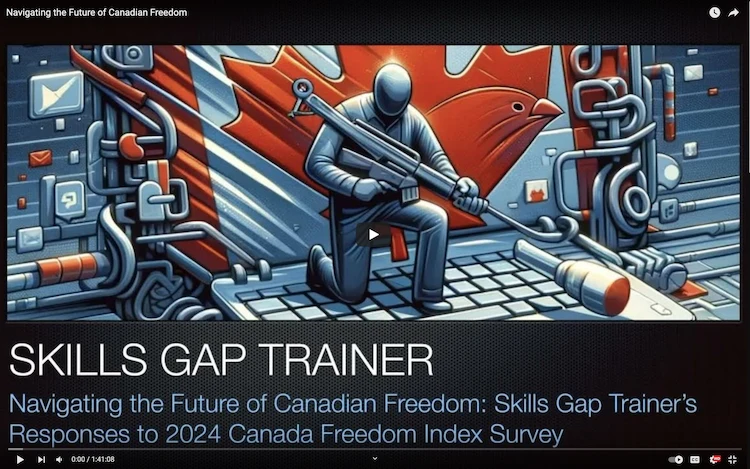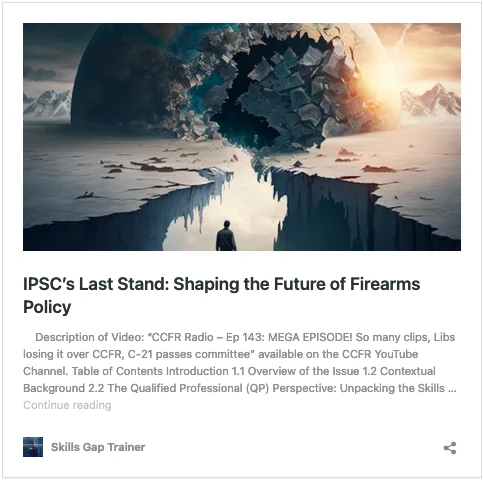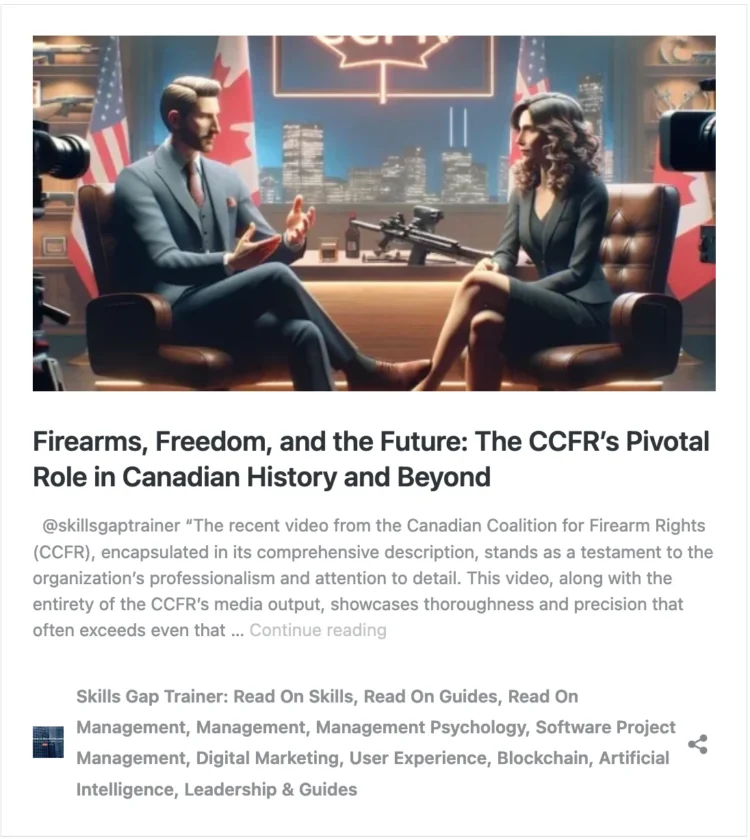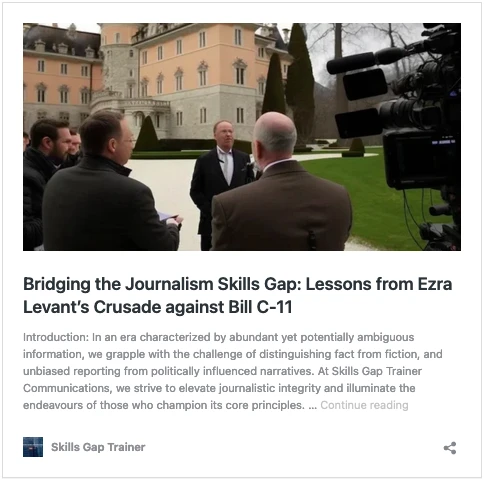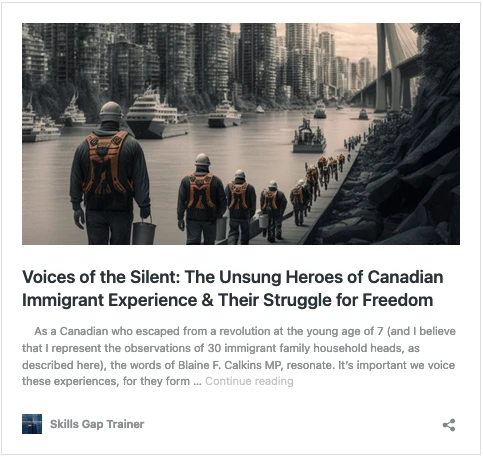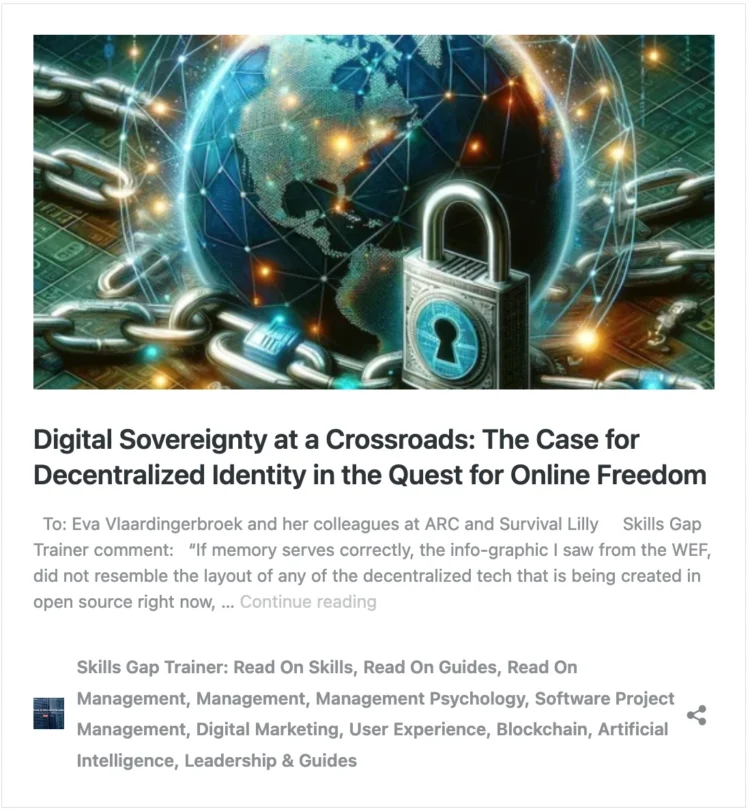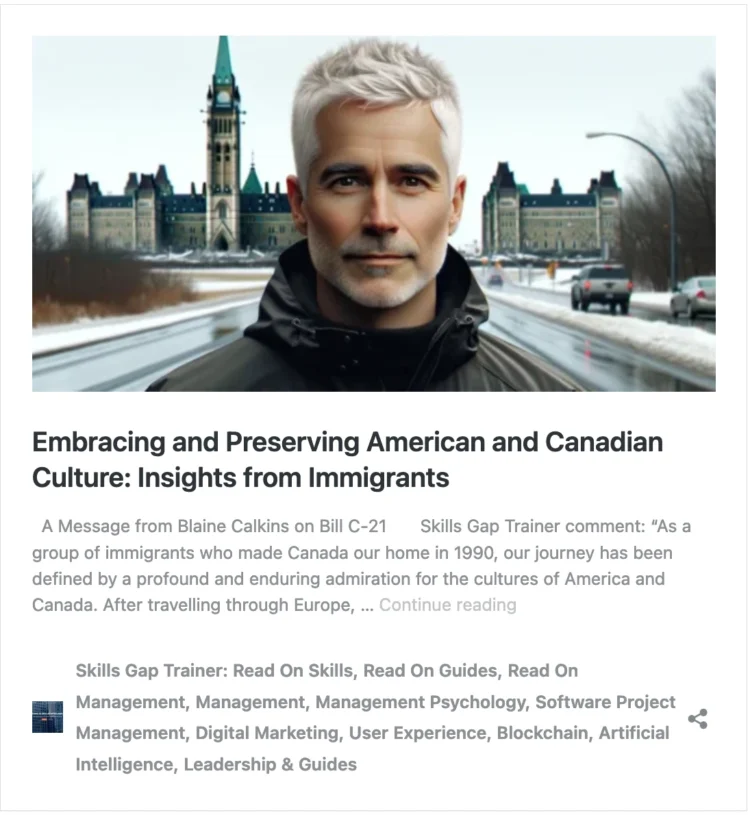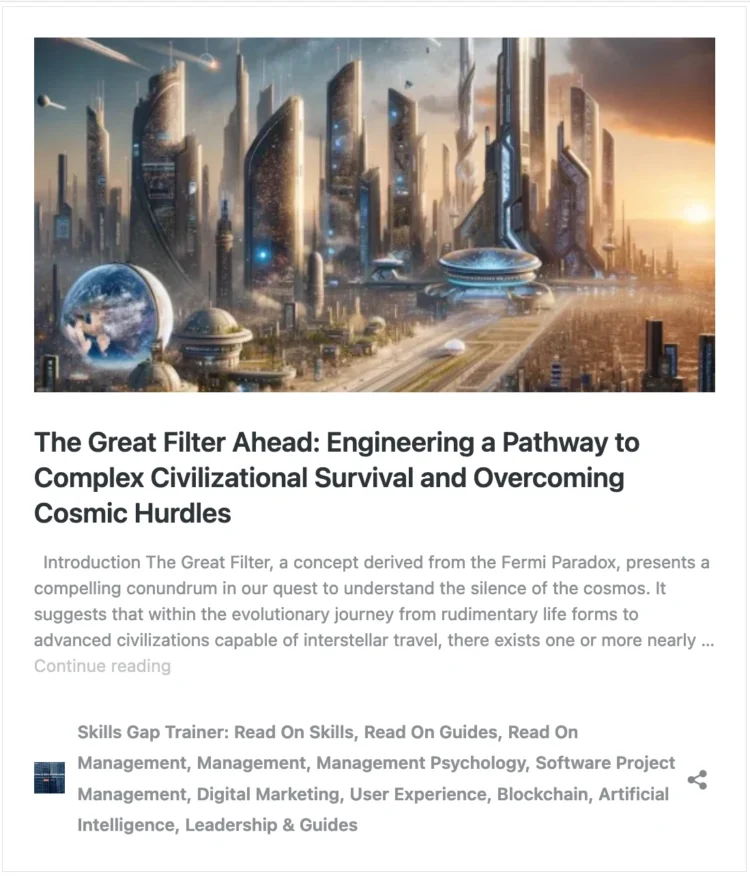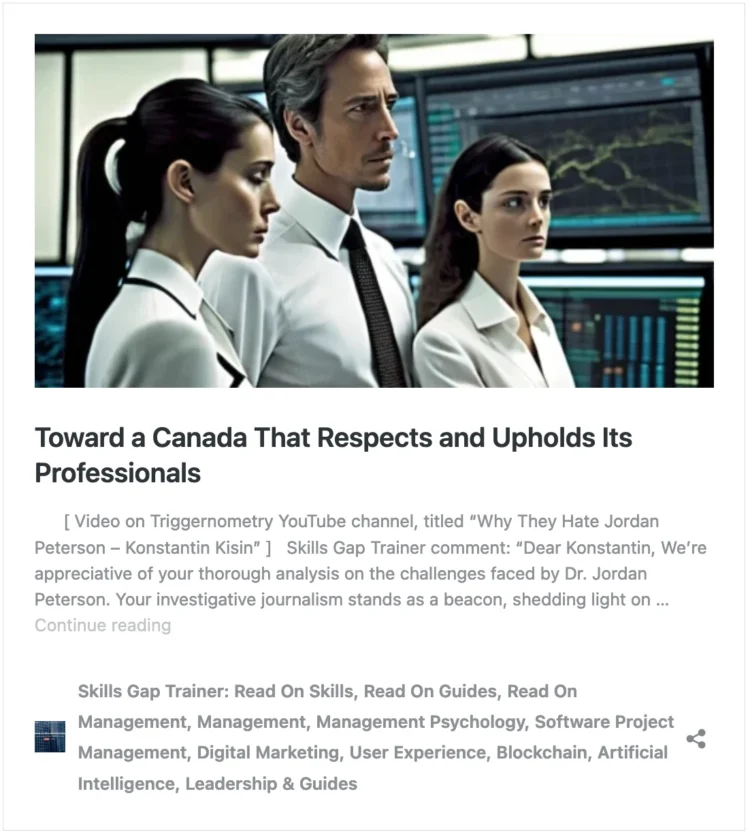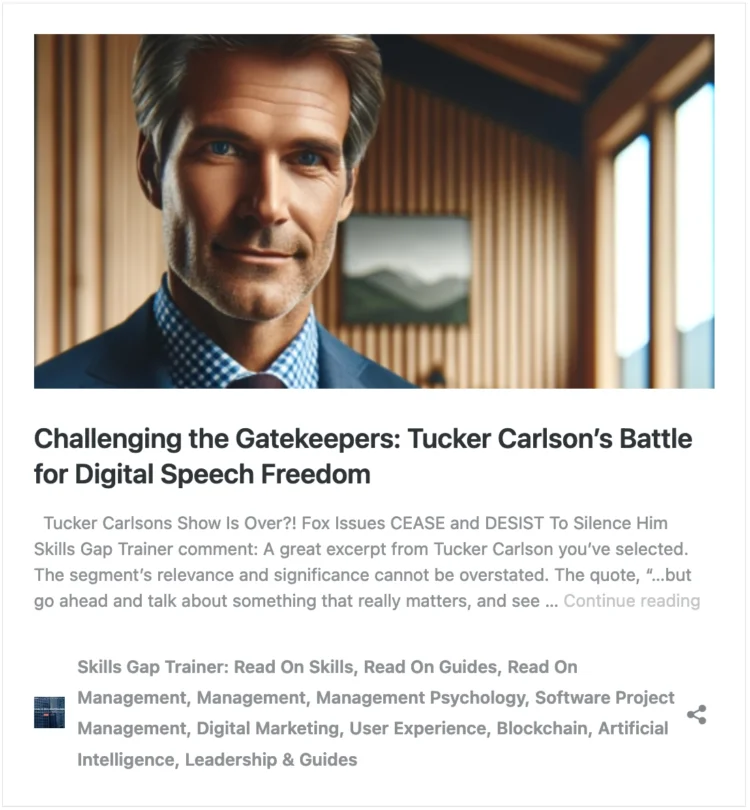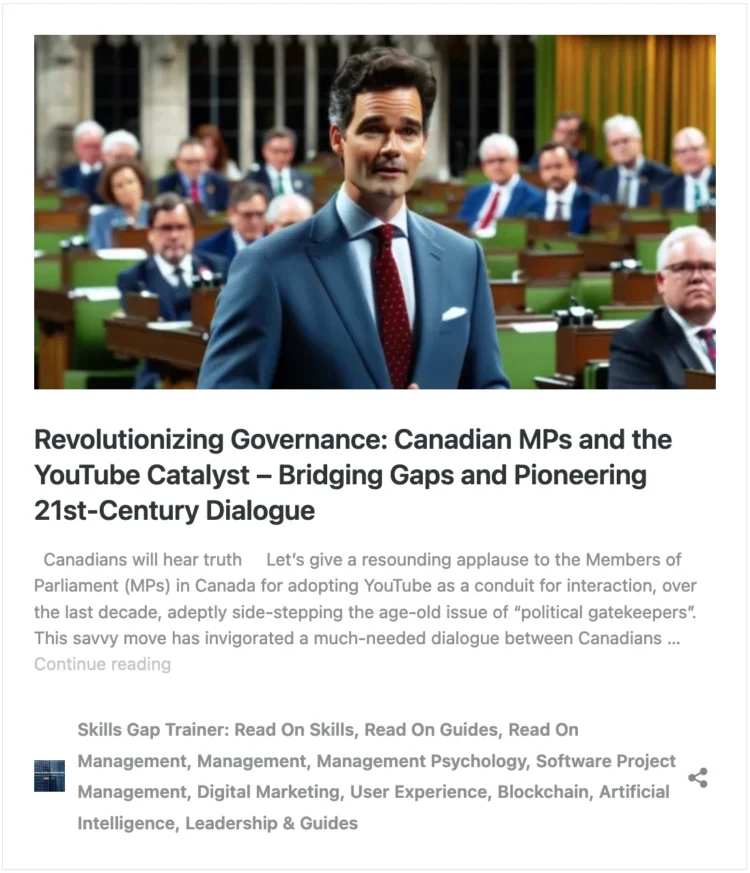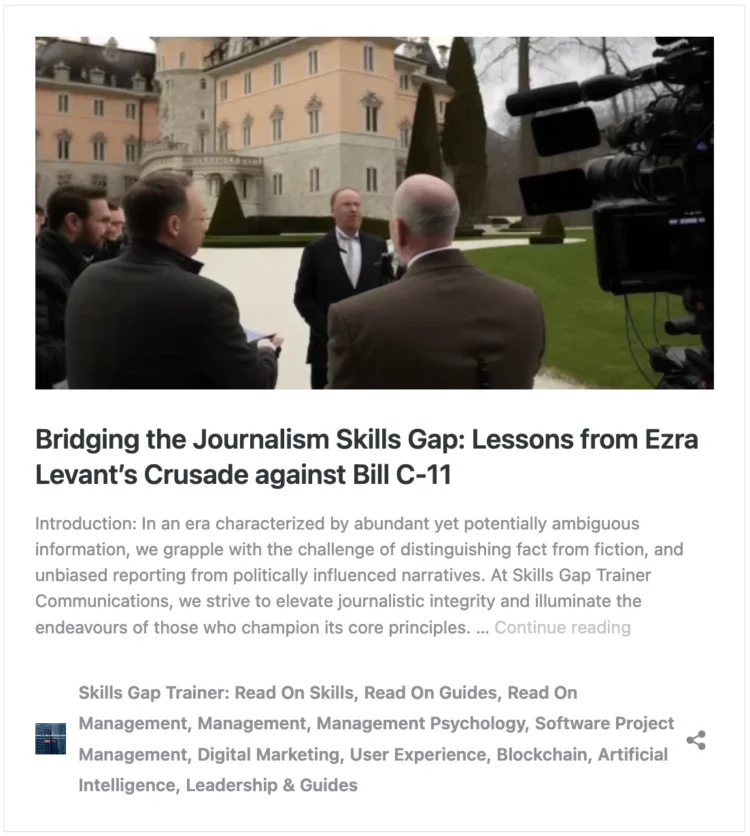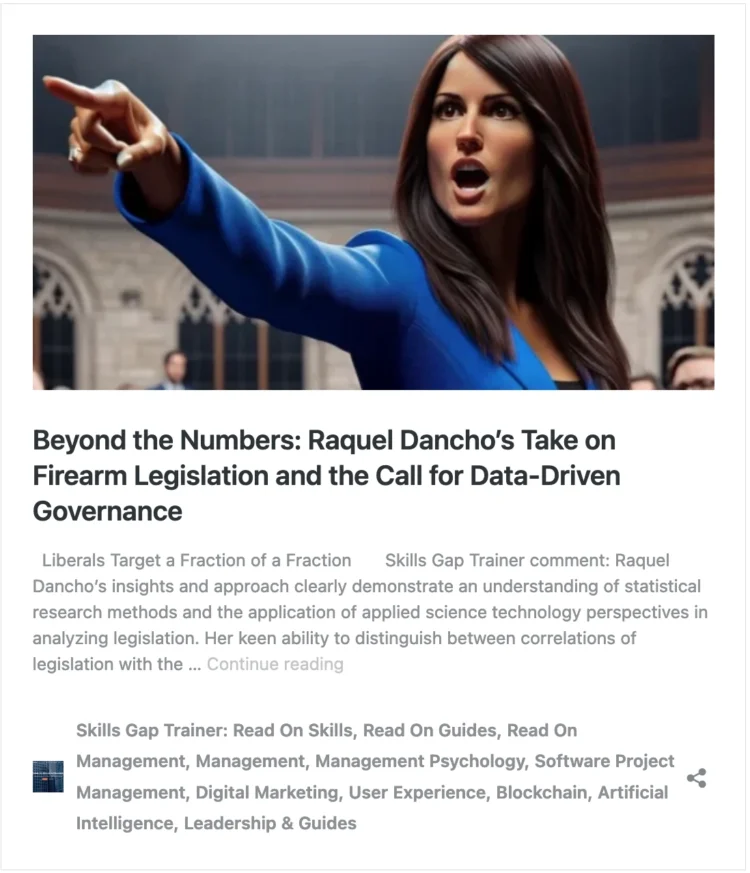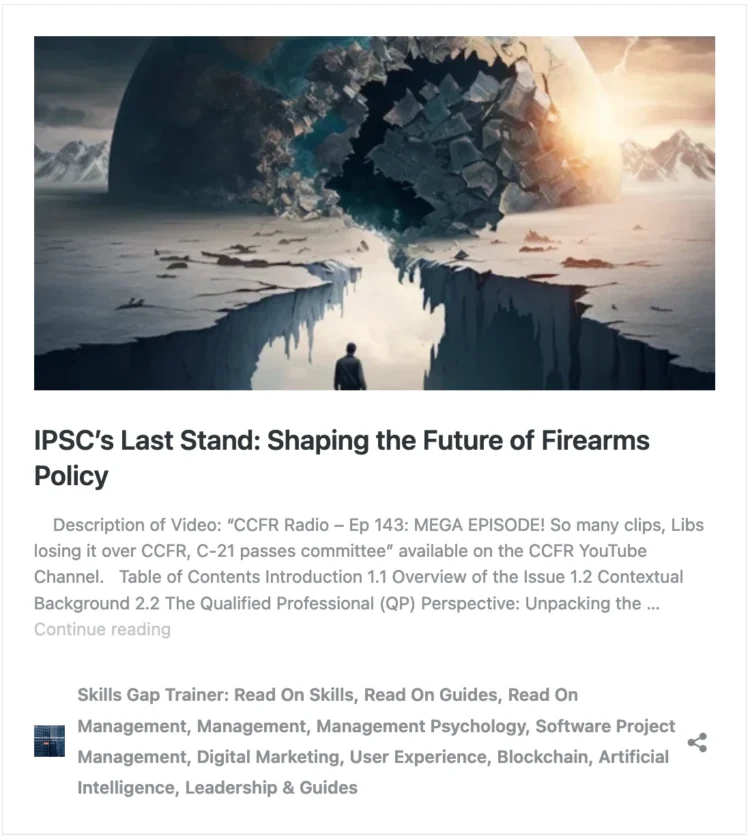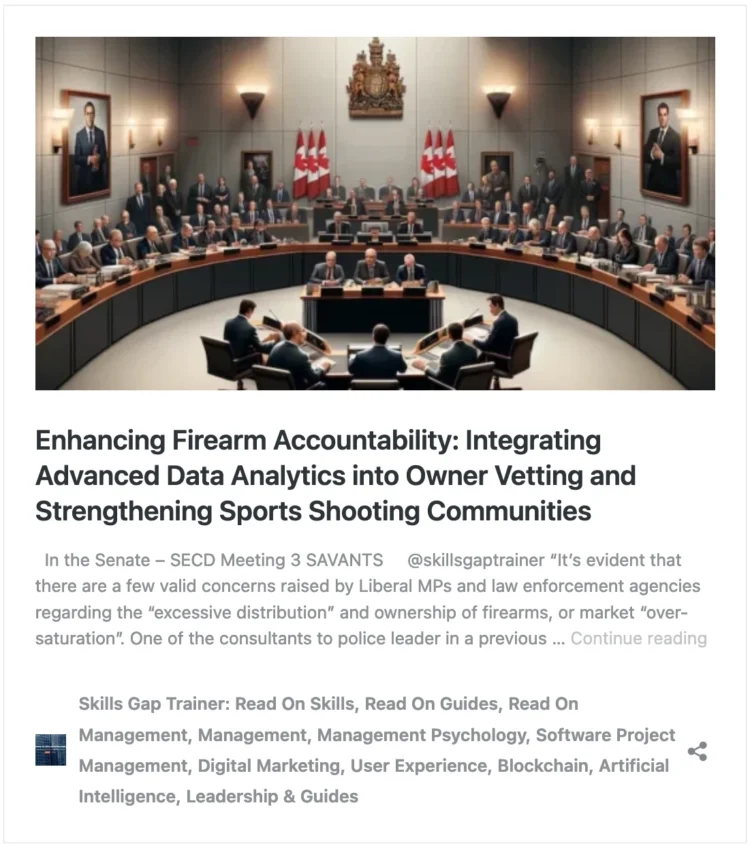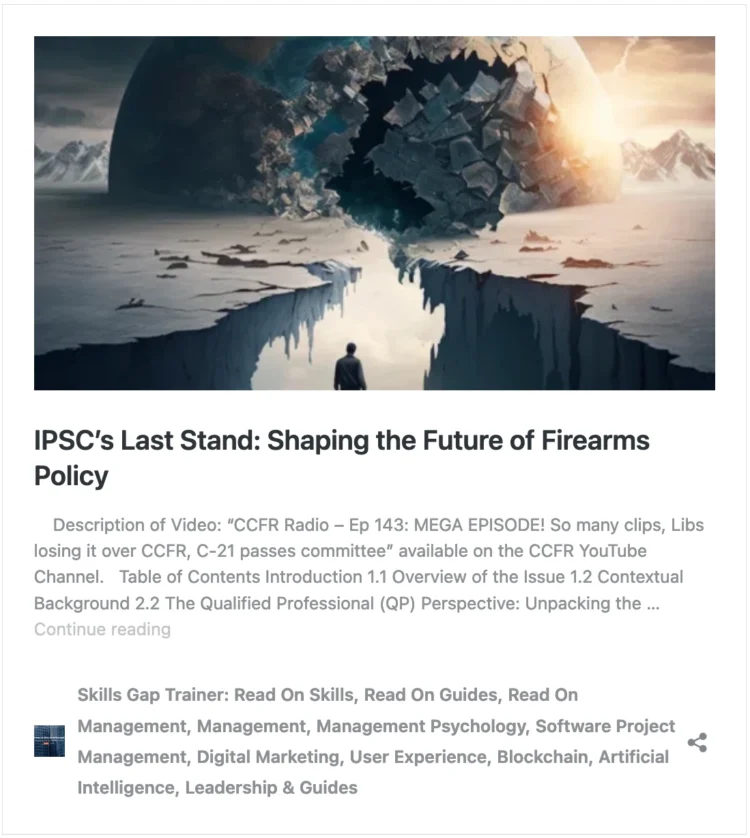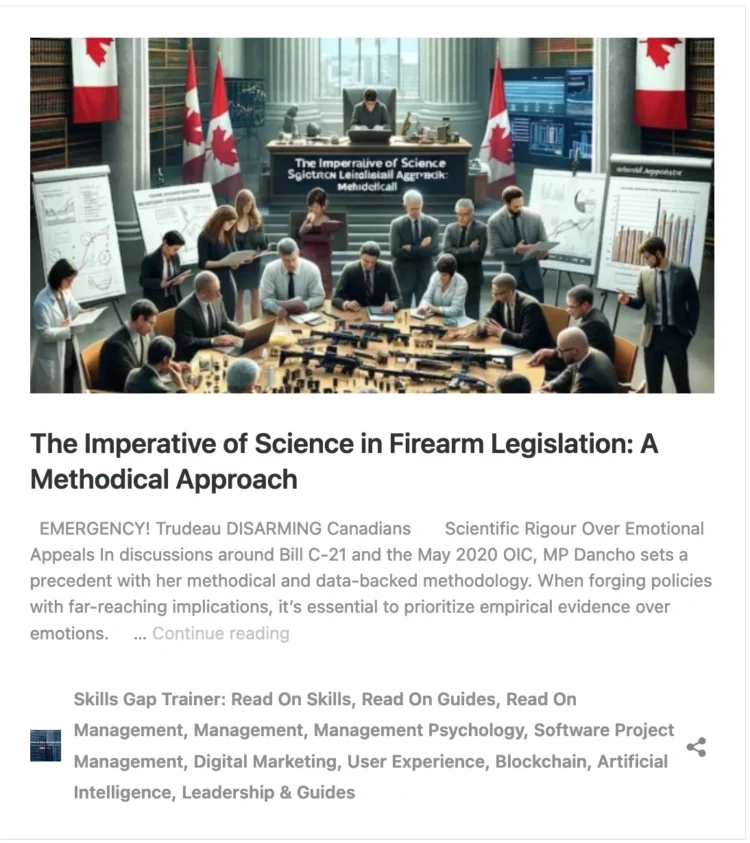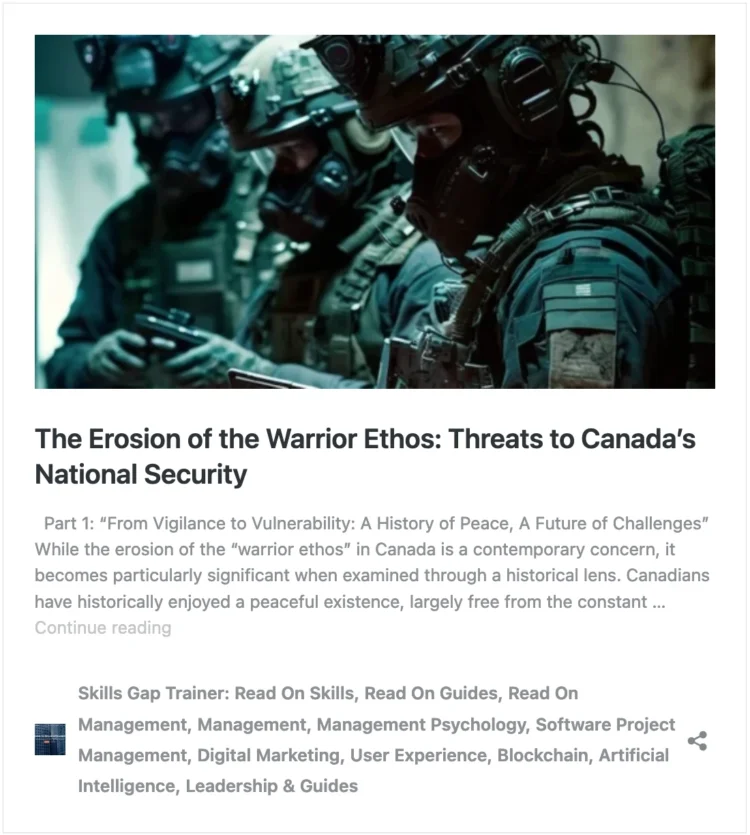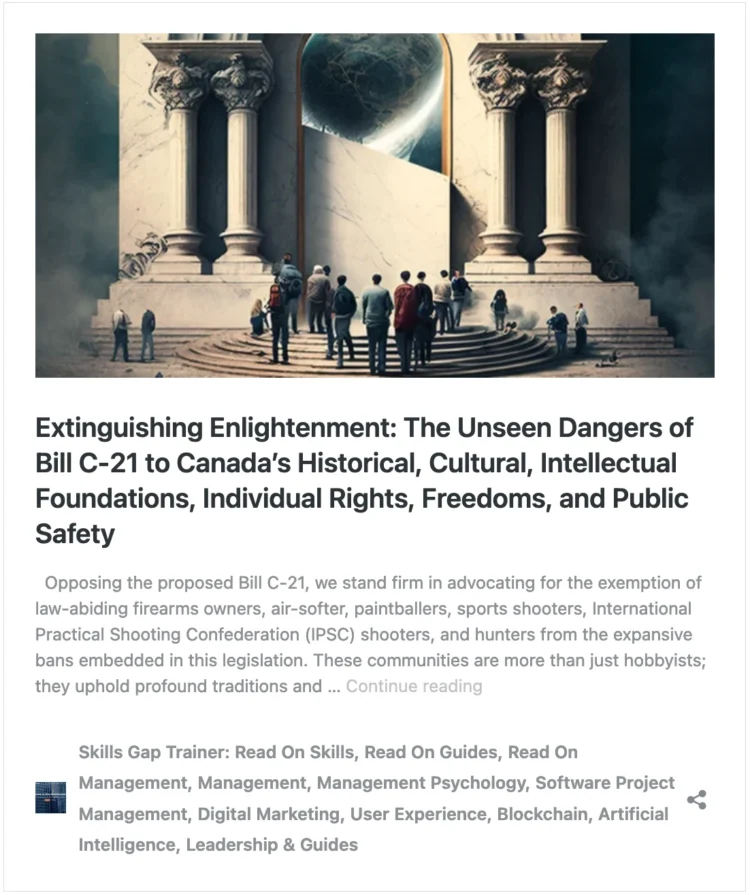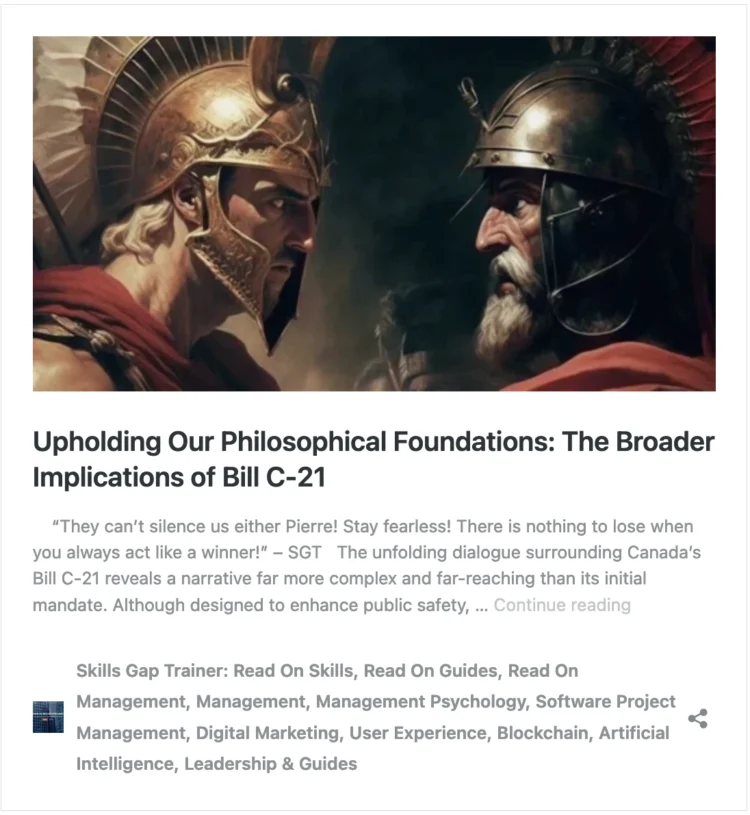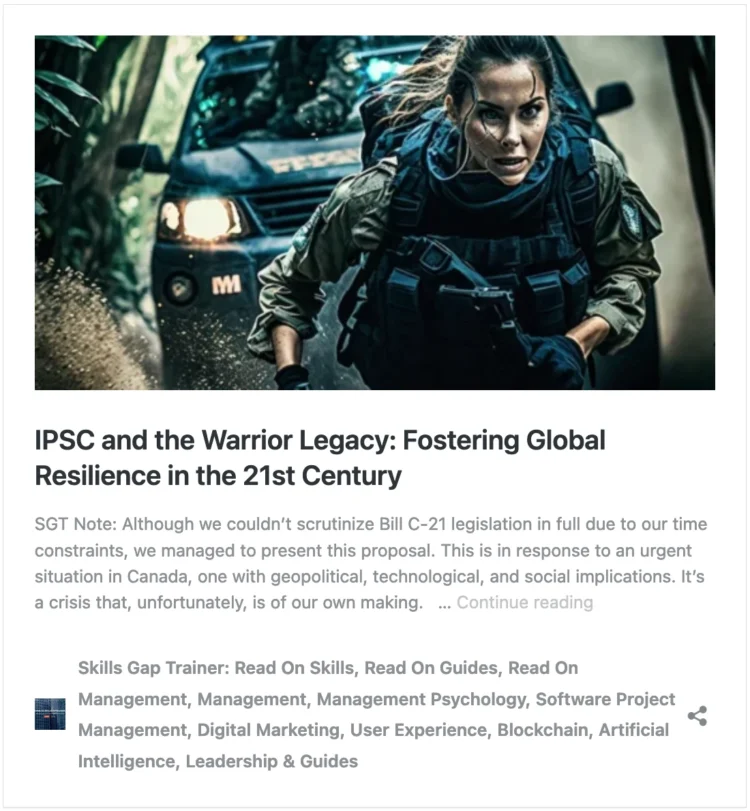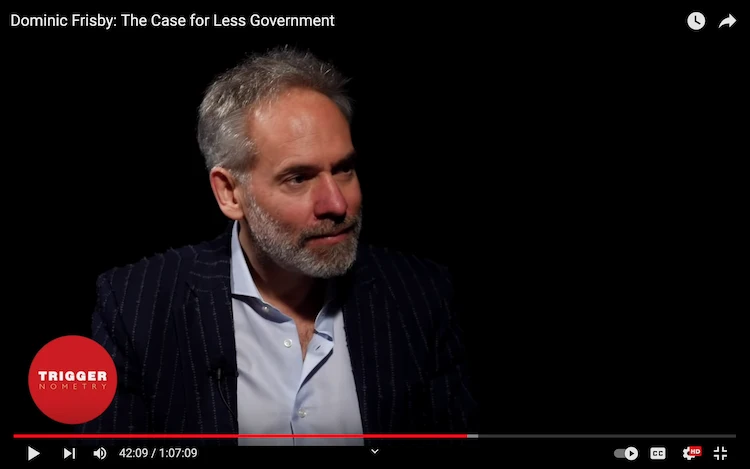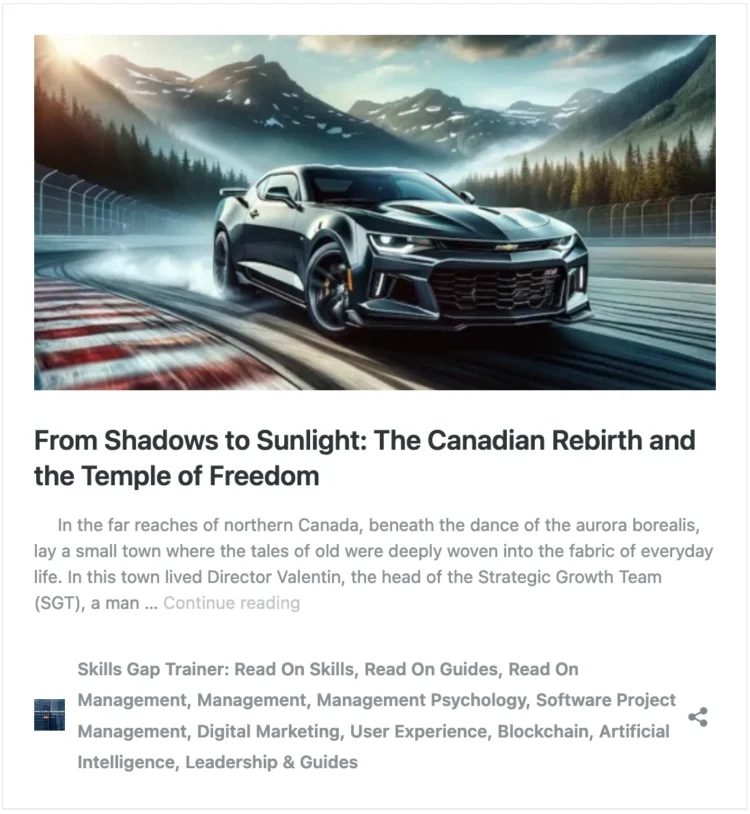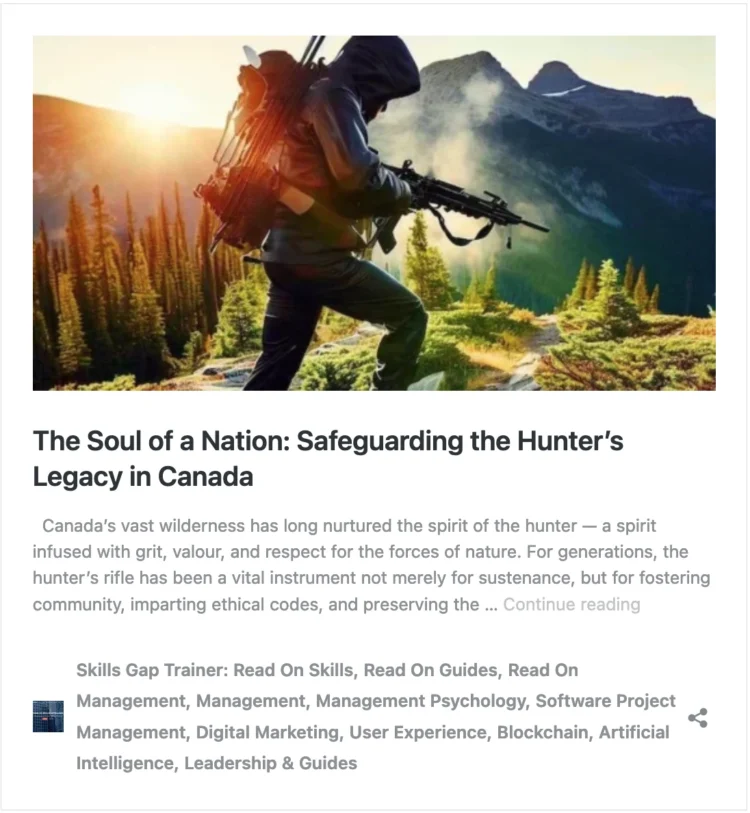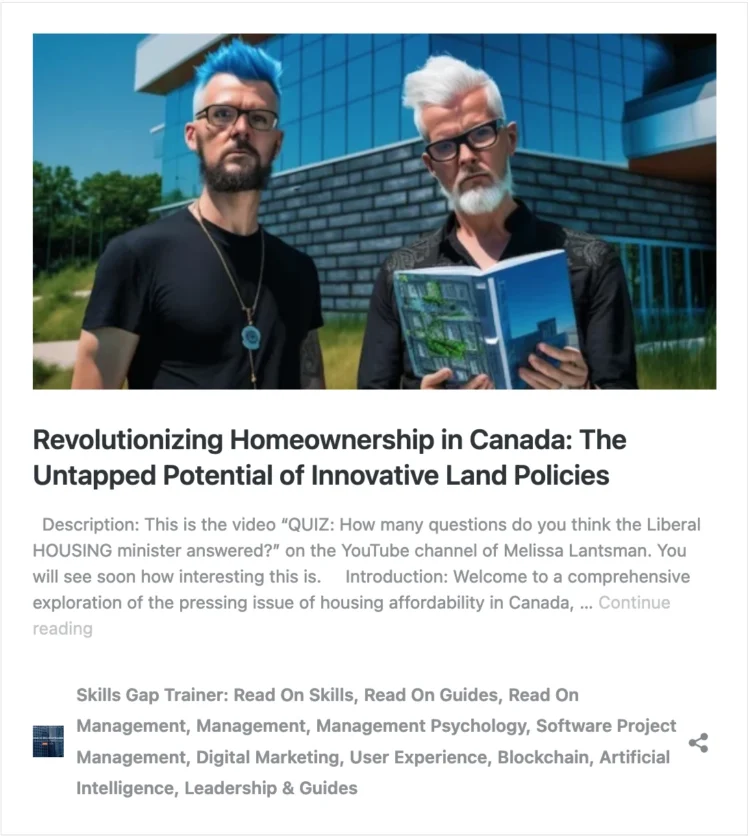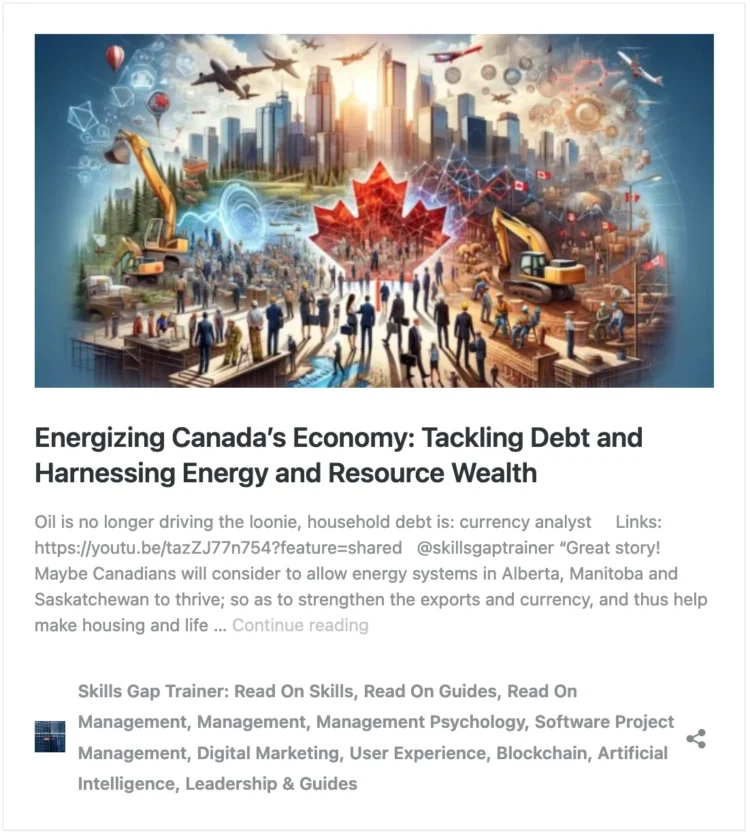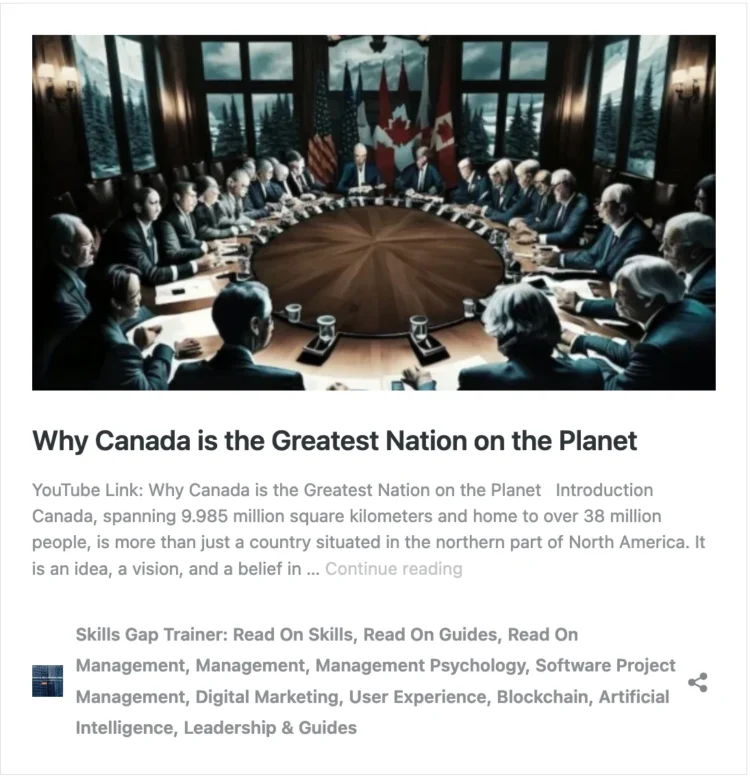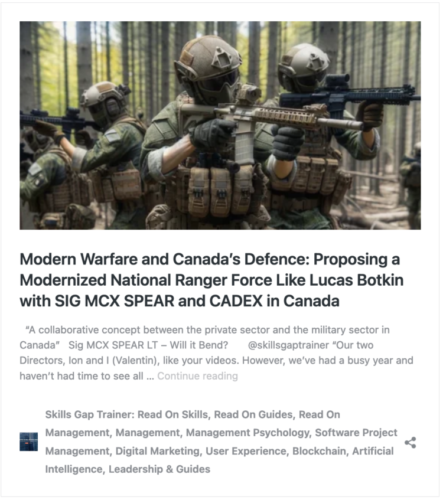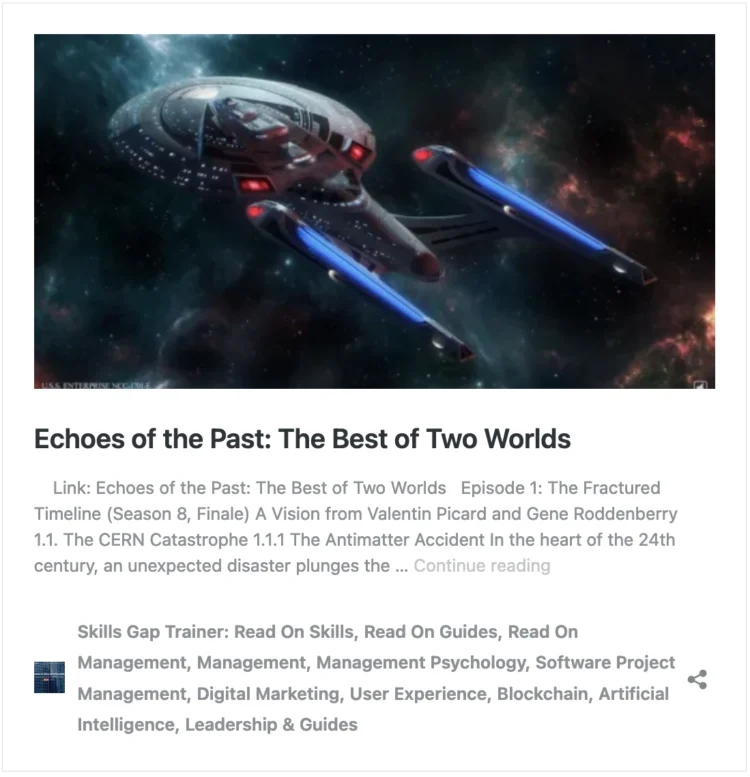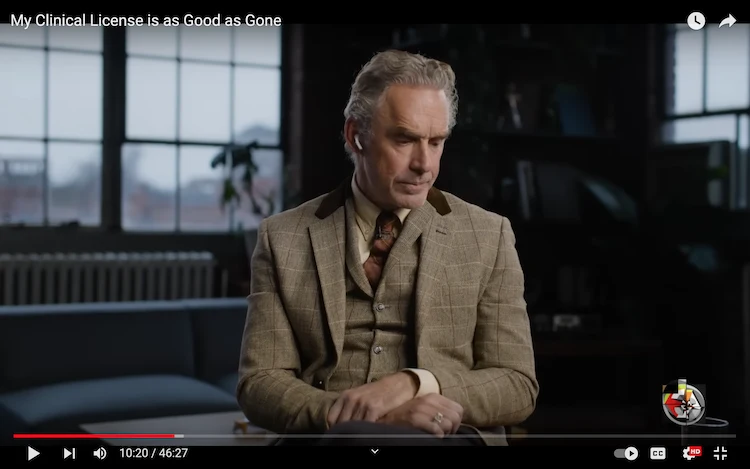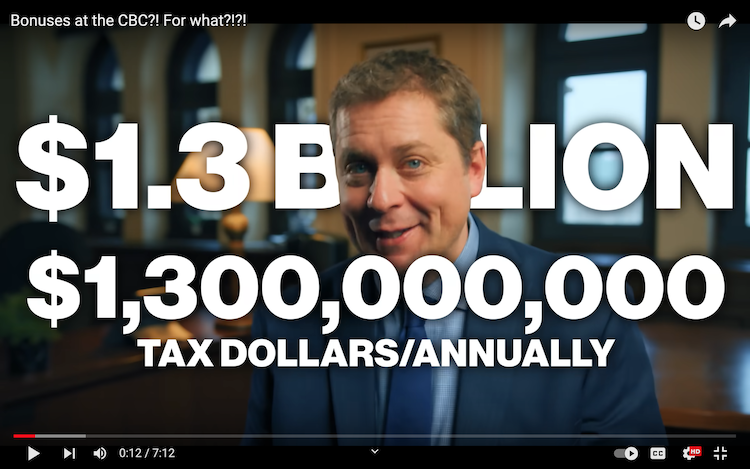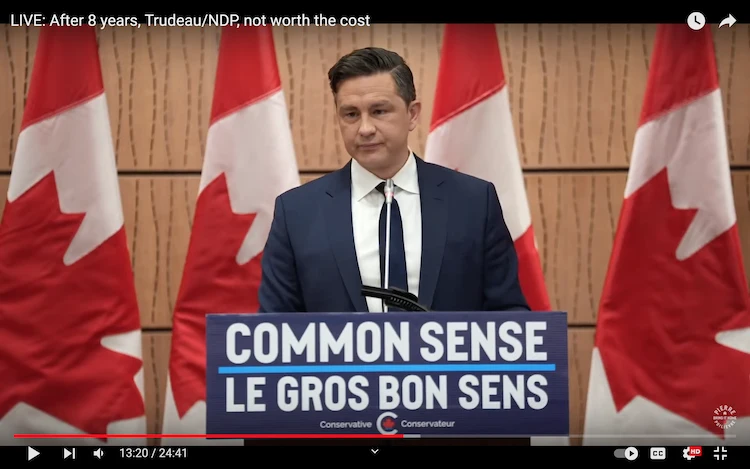Link: https://youtu.be/JE_UlXXjfjc?si=HApDdUjd5iALTuub
From: Skills Gap Trainer
To: Conservative Party
Date: Mon Jan 29th, 2024
Re: 2024 Canada Freedom Index Survey, Optional Comments Section, Attached Notes, Responses, Brief Summary of Reports
1/ How would you describe the level of personal freedoms Canadians enjoy now compared to the level they enjoyed before Justin Trudeau became prime minister in 2015?
Report: ”IPSC’s Last Stand: Shaping the Future of Firearms Policy”
The article “IPSC’s Last Stand: Shaping the Future of Firearms Policy” on Skills Gap Trainer discusses the impact of changes in firearms policy on public safety, the role of the International Practical Shooting Confederation (IPSC), and the broader implications for Canadian society. It highlights the IPSC’s contributions to public safety and national security, emphasizing its role in skills development for law enforcement and emergency response teams. The article also addresses communication failures between policymakers and IPSC enthusiasts and explores the potential for IPSC to function as a vetting institution in public safety. Additionally, it delves into the cultural significance of the IPSC, presenting it as a symbol of Canada’s warrior ethos and discussing the potential legal and societal impacts of its suppression. The article concludes by calling for a more nuanced approach to firearms policy, one that respects individual rights and public safety, and recognizes the value of IPSC in Canadian society. Link: https://skillsgaptrainer.com/ipsc-last-stand/
Report: ”Firearms, Freedom, and the Future: The CCFR’s Pivotal Role in Canadian History and Beyond”
The article from the Canadian Coalition for Firearm Rights (CCFR) discusses the organization’s role in advocating for firearms rights and freedom in Canada. It emphasizes the historical importance of firearms in Canadian culture and the necessity of preserving this heritage. The article highlights the contributions of key figures in the CCFR, Rod Giltaca and Tracey Wilson, and their efforts in educating the public about firearms. Their work is positioned as essential for maintaining the shared history and culture of firearms, suggesting that current policies might lead to a reduction in freedoms related to firearms ownership and usage. The piece underscores the importance of practical experience in firearms education and posits that neglecting this aspect could lead to a loss of cultural and historical knowledge. The article also touches on broader themes of national identity, cultural preservation, and the potential impact of legislative changes on these areas. Link: https://skillsgaptrainer.com/firearms-freedom-and-the-future/
Report: ”Bridging the Journalism Skills Gap: Lessons from Ezra Levant’s Crusade against Bill C-11: Inspired by Ezra Levant’s fight against Bill C-11”
The article discusses Ezra Levant’s critique of Bill C-11, a proposed Canadian law regarding internet regulation. Levant, a journalist, argues that this bill could lead to increased digital censorship, impacting freedom of speech and online privacy. His analysis suggests that the bill may restrict the free flow of information and hinder democratic principles. Levant’s approach highlights the importance of journalistic investigation in scrutinizing potential threats to freedom, emphasizing the need for transparency and public engagement in legislative processes. This case exemplifies concerns about diminishing freedoms in Canada, particularly in the context of digital communication and media regulation. Link: https://skillsgaptrainer.com/bridging-the-journalism-skills-gap/
Report: “Voices of the Silent: The Unsung Heroes of Canadian Immigrant Experience & Their Struggle for Freedom”
The article “Voices of the Silent: The Unsung Heroes of Canadian Immigrant Experience & Their Struggle for Freedom” primarily focuses on the experiences of immigrants in Canada post-2010. It details the challenges and resilience of skilled professionals from various countries who, despite their qualifications and experience, often find themselves in low-skilled jobs due to systemic barriers in Canada. The narrative highlights the contrast between the freedoms enjoyed in Canada and the oppressive conditions in their home countries, emphasizing the value and appreciation immigrants have for Canadian liberties. Additionally, the article points out the under-representation of immigrant voices in policy-making, suggesting a need for more inclusive and diverse perspectives in shaping laws and policies, particularly those affecting freedom and rights. Link: https://skillsgaptrainer.com/voices-of-the-silent-the-unsung-heroes/
Report: “Digital Sovereignty at a Crossroads: The Case for Decentralized Identity in the Quest for Online Freedom”
The article “Digital Sovereignty at a Crossroads: The Case for Decentralized Identity in the Quest for Online Freedom” raises concerns about the potential loss of freedom due to the development and implementation of digital systems, particularly centralized digital ID systems. It highlights apprehensions about the lack of transparency in the design and control of these systems. Questions are raised about who the architects of these systems are – whether they are engineers in Canada or abroad, or if they are influenced by politicians or corporate alliances within the World Economic Forum (WEF). The article emphasizes the importance of having digital systems that are public, transparent, and blockchain-based, developed by communities of engineers and computer scientists in a transparent and citizen engaged way. It suggests that the adoption of such centralized systems, instead of open source decentralized systems, without public debate or clear understanding of their impact on freedom, poses a risk to individual autonomy and privacy. The design decisions behind these systems, and who ultimately controls these designs and the tech architecture, could have significant implications for Canadian citizens’ freedom in the digital age and for the authority of the Parliamentary system. Link: https://skillsgaptrainer.com/digital-sovereignty-at-a-crossroads/
Report: “Embracing and Preserving American and Canadian Culture”
The article “Embracing and Preserving American and Canadian Culture: Insights from Immigrants,” particularly focuses on the experiences and observations of immigrants who admire American and Canadian cultures. It discusses their concerns about cultural shifts and policy-making trends that seem to prioritize accommodating new immigrant identities over reinforcing core North American values. The article mentions a lack of emphasis on traditional North American cultural elements in various sectors like education, media, and social circles. Particularly, it highlights concerns over the impact of policies like Bill C-21 on cultural aspects such as firearm rights, seen as symbols of liberty and self-reliance in North American culture. The article calls for future leaders to understand and value these cultural foundations to prevent their dilution or loss. Link: https://skillsgaptrainer.com/embracing-american-and-canadian-culture/
Report: “The Great Filter Ahead: Engineering a Pathway to Complex Civilizational Survival and Overcoming Cosmic Hurdles”
The article “The Great Filter Ahead: Engineering a Pathway to Complex Civilizational Survival and Overcoming Cosmic Hurdles” presents a comprehensive overview of the various existential challenges humanity may face in the upcoming decades, particularly between 2030 and 2050. The concept of the Great Filter, derived from the Fermi Paradox, is used to describe critical barriers in the evolutionary process that could impede the development and longevity of a civilization. These challenges are multifaceted and include environmental crises, technological and scientific risks, economic and financial instabilities, political and geopolitical conflicts, societal and cultural issues, health and pandemic threats, space and astronomical dangers, and issues related to urbanization, education, ethics, globalization, psychology, demographics, law and justice, media, philosophy, agriculture, cybersecurity, cultural heritage, energy, space exploration, virtual realities, transportation, and more.
The potential impact of these challenges on freedom ranges from increased governmental control and surveillance to protect public safety, to restrictions on individual liberties and expression. As societies grapple with these challenges, there may be a need for tighter regulation and oversight, which could impinge upon personal freedoms and privacy. The article suggests that addressing these issues requires innovative solutions and a collaborative global response, emphasizing the role of engineering and technological advancements in overcoming these hurdles. The focus is on creating sustainable, resilient systems that can withstand the array of challenges poised by the Great Filter, ensuring the survival and prosperity of human civilization.
In conclusion, the article underscores the importance of a proactive, unified approach to navigate these complex challenges, highlighting the need for a balance between maintaining individual freedoms and ensuring the collective safety and advancement of humanity.
Trudeau and some Liberal Party MPs have endangered national public safety by not reading any of the books relating to The Great Filter problem, and taking the opposite action of what is necessary to rise to the challenges of this expansive problem set. Link: https://skillsgaptrainer.com/the-great-filter-ahead-engineering-a-pathway/
Report: “Navigating the Future: Unveiling the Impacts of Carbon Tax Policies on Generational Wealth and Freedom”
The article “Navigating the Future: Unveiling the Impacts of Carbon Tax Policies on Generational Wealth and Freedom” discusses potential freedom loss related to carbon tax policies. It suggests that such taxes might disproportionately burden lower-income groups, thereby affecting economic freedom. The narrative draws on historical examples of oppressive regimes to highlight the risks of excessive taxation and governance overreach. Additionally, the article argues that carbon taxes could exacerbate income inequality and societal unrest, underlining the importance of balancing environmental and economic policies. This approach aims to ensure social equity while preserving individual freedoms and generational wealth. The article essentially warns against the potential negative impacts of carbon tax policies on societal freedom and economic well-being. Link: https://skillsgaptrainer.com/navigating-the-future/
Report: “Toward a Canada That Respects and Upholds Its Professionals”
The article discusses concerns about the erosion of freedoms in Canada, specifically focusing on the professional sector. It refers to legislative changes in professional regulation, which might be reducing the autonomy and authority of professionals. The article uses Dr. Jordan Peterson and Pierre Poilievre as examples of individuals standing against these trends. Peterson is known for his stance on free speech, particularly in academic contexts, while Poilievre is highlighted for his focus on economic policies and fiscal responsibility. The concerns expressed in the article suggest that recent policies and societal shifts might be restricting traditional freedoms, including freedom of speech and economic choices, for Canadian professionals. This narrative indicates a broader anxiety about the potential loss of individual and professional liberties in the face of changing government policies and societal norms. Link: https://skillsgaptrainer.com/toward-a-canada-that-respects-professionals/
2/ How are you concerned about the Liberal government’s efforts to exert greater levels of control over online content and media?
Report: “Challenging the Gatekeepers: Tucker Carlson’s Battle for Digital Speech Freedom”
The report highlights Tucker Carlson’s struggle against restrictions in digital speech. It emphasizes the need for more in-depth content on social media to foster open communication and counteract the control exerted by ‘digital gatekeepers’ who may limit the spread of informative dialogue. The article aligns with broader concerns about digital freedom and the challenges faced in distributing professional educational content in the face of potential censorship or suppression. This context is especially pertinent in scenarios where less qualified tech moderators working at social media giants or tech media hosting platforms, breach terms and conditions, codes and procedures, to go against educators or political rivals, tech traffic moderators without appropriate professional or academic backgrounds, not even a degree, not even a paper mill degree from emerging country, can censor content from qualified individuals like PEng, AScT, I.S.P., and PhDs. This situation raises concerns about the ease with which educational channels can be censored or suppressed compared to entertainment or infotainment channels, which often receive more visibility, more impressions, less censorship and less interference from social media giants or other tech giants. Link: https://skillsgaptrainer.com/challenging-the-gatekeepers-tucker-carlson/
Report: “Revolutionizing Governance: Canadian MPs and the YouTube Catalyst”
The article “Revolutionizing Governance: Canadian MPs and the YouTube Catalyst – Bridging Gaps and Pioneering 21st-Century Dialogue” applauds Conservative (MPs) for leveraging YouTube to connect with citizens, thereby bypassing traditional political barriers. It highlights Pierre Poilievre’s early adoption of YouTube as a platform for genuine engagement and merit-based success. However, the article raises concerns about potential legislative changes, such as censorship related legislation, which might impinge on digital freedoms, restrict free speech, and disrupt the free-market news ecosystem in Canada and new political engagement system in Canada. The piece calls on Conservative MPs to oppose censorship restriction to political engagement via social media and censorship restriction via journalism/news restriction on social media, in defence of Canada’s freedom and democratic principles.
The Conservative Party has undergone a digital transformation, optimizing government operations through effective feedback mechanisms from the public via commenting systems of YouTube and Twitter. This approach has significantly reduced administrative bureaucracy, fostering a more agile, lean and technically adept governance system. This system is increasingly vital in meeting the accelerating 21st-century demands, including rapid decision-making at higher government levels, keeping pace with rivals in a cold war mode, and adapting to the new age of imperial corporate alliance and imperial political alliances. It’s also essential for staying abreast of the exponential growth in computing and AI systems, especially given the rising influence of tech (AI companies) and non-tech corporations (WEF, pretending to be tech and science) in the global market as their revenues of tech order and financial managers (Blackrock, Vanguard, etc) exponentially compound revenues, and deviantly use citizen investment funds to challenge and manipulate the destiny of small nation sates (nations which have minuscule debt based budgets).
The efficiency method, or the 360-degree feedback approach, commonly used in User Experience Research and Design or professional management practice, has been instrumental in gaining this competitive edge for corporations, and now Conservative MP are using this process. Skills Gap Trainer, an educator in user experience research and design, emphasizes that open communication from the public is crucial for the digitization and digital transformation of government and the acceleration of government effectiveness in age of neo-feudalism, new age imperialism, and the rise of tech, political and economic alliance orders. This competitive user experience feedback function via Twitter and Youtube and other digital platforms online, is key in rectifying the economic, social, technical, and economic disorder attributed to Trudeau’s administration from 2015 to 2023. It is this free speech digital mechanism that has been made available to citizens of Canada, that has enabled a more agile and dynamic government operation for Conservative MP to make higher quality decisions circa 2020 to 2023, a new level of performance that is now essential to deal with the new age of disorder. The Conservative MP is using crowd intelligence to supplement traditional informational mechanisms in the government, to quickly access, identify experts, and pool the best strategy for research and include a broader set of data in government operational planning and strategy evaluations mechanisms from a larger set of experts that are available in the public instead of the ore limited set of experts traditionally available I small quantities in government bureaucracy.
However, the article warns that Trudeau’s censorship and legislative changes threaten to undermine this progress that has been made by Conservative MP and the tech giants in terms of efficient digital governance, efficient management, efficient coordination, and efficient networking systems such as Twitter, Youtube and LinkedIn. Such news streaming, social and political networking facilities, if censored, could hinder Canada’s ability to transform into a lean, agile, project management-oriented digital organization, potentially reverting the government to an outdated, collectivistic, 20th-century administrative model as the alternative. This regression could be detrimental, especially considering the challenges outlined in the “Great Filter” article, which materialize between 2020 to 2050, peaking sometime in 2035, 2040, 2045 or 2050. Link: https://skillsgaptrainer.com/revolutionizing-governance-canadian-mps-21st-century/
Report: “Bridging the Journalism Skills Gap: Lessons from Ezra Levant’s Crusade against Bill C-11”
The article presents Ezra Levant’s critical view of Bill C-11, a proposed Canadian legislation that could significantly reshape internet regulation and censorship. Levant, a prominent Canadian media figure and former host of Rebel News, raises concerns about the bill’s potential impact on freedom of speech, online privacy, and information accessibility. He argues that the bill, backed by Prime Minister Justin Trudeau, could lead to increased government control over the media, posing a threat to democratic principles.
Levant’s discourse extends beyond criticism to a call to action, emphasizing the vital role of journalists in safeguarding democratic processes against such legislative changes. He advocates for a deeper understanding and communication of complex legal and technological issues, highlighting the importance of journalistic integrity.
Additionally, Levant proposes a plan of resistance against the bill, including public engagement and legal challenges, reflecting his commitment to combat perceived government overreach in digital communication. The article also touches on the inherent risks of journalism, portraying Levant as a figure standing against censorship and suppression, and underscoring the need for journalistic courage in the face of political and social adversity. His stance exemplifies the critical role of a vigilant media in maintaining democratic freedoms. Link: https://skillsgaptrainer.com/bridging-the-journalism-skills-gap/
3/ Do you agree the federal government should be banned from imposing new COVID-19 vaccine mandates?
In the realm of public health and individual rights, few debates have been as contentious and ethically complex as the issue of government-imposed COVID-19 vaccine mandates. This discourse is not merely a contemporary dilemma; it is deeply entrenched in a rich historical and philosophical context. Throughout history, an intricate tapestry of laws, ethical norms, philosophical principles, professional standards, and religious doctrines have championed the paramount importance of individual autonomy, sovereignty, and the inviolable right to personal bodily security. These principles, transcending time and culture, collectively advocate for a fundamental human prerogative: the right of individuals to exercise control over their own bodies, including making informed medical decisions.
As we navigate this intricate landscape, each principle stands as a testament to the enduring values of liberty, autonomy, and self-determination. From the classical liberal philosophies of John Locke and John Stuart Mill to the nuanced perspectives of Immanuel Kant and the moral imperatives of medical ethics, every doctrine offers a unique lens through which we can examine the concept of mandated vaccines. This exploration is not just an academic exercise; it is a crucial inquiry into the heart of human rights and ethical governance.
Evaluating each principle against the concept of mandated vaccines, we list the key principles and then determine whether each principle contradicts or does not contradict the idea of mandated vaccines:
(Historical and philosophical concepts that emphasize individual liberty and autonomy include:
John Locke’s Theory of Natural Rights:
Contradicts Mandated Vaccines. Locke’s emphasis on fundamental rights to life, liberty, and property suggests that mandated vaccines, which may be seen as an infringement on personal liberty and bodily autonomy, contradict this principle.
John Stuart Mill’s Principle of Liberty:
Contradicts Mandated Vaccines. Mill’s advocacy for individual freedom and autonomy, especially the right to act as one wishes without harming others, is in conflict with the idea of mandated vaccines.
Immanuel Kant’s Concept of Autonomy:
Contradicts Mandated Vaccines. Kant’s principle of autonomy and rational self-governance implies that moral actions should be chosen freely, without external coercion, which contradicts the concept of forced vaccination.
Religious Teachings on Sanctity of the Body:
Contradicts Mandated Vaccines. Many religious doctrines that advocate for the sacredness of the human body and the importance of individual conscience would view mandated vaccines as a contradiction to these teachings.
Thomas Hobbes’ Social Contract Theory:
May Not Contradict Mandated Vaccines. Hobbes’ theory suggests that individuals agree to certain limits on their freedom for collective security, which could be interpreted as not necessarily contradicting mandated vaccines in the interest of public health.
Jean-Jacques Rousseau’s Views on Freedom and Social Contract:
May Not Contradict Mandated Vaccines. Rousseau believed in the inherent freedom of individuals but also in societal agreements aligning with the collective will, which could be interpreted as allowing for mandated vaccines under certain collective agreements.
These concepts have significantly influenced modern views on personal sovereignty, individual rights, and ethical considerations in medical and legal contexts.)
Medical Ethics:
The Hippocratic Oath, a foundational document in medical ethics, emphasizes “do no harm,” which has been interpreted as respecting patient autonomy. Modern medical ethics also incorporate principles like informed consent, emphasizing a patient’s right to make their own medical decisions.
(In medical ethics, several key principles emphasize respecting patient autonomy and the right to make personal medical decisions:
Hippocratic Oath:
Contradicts Mandated Vaccines. The principle of “do no harm” and respecting patient autonomy in the Hippocratic Oath would likely view mandated vaccines as a contradiction, especially if they go against the patient’s will.
Informed Consent:
Contradicts Mandated Vaccines. The requirement for informed consent in medical ethics, where patients must be informed about and consent to medical procedures, directly contradicts the idea of mandated vaccines.
Principle of Beneficence:
May Not Contradict Mandated Vaccines. This principle obligates healthcare professionals to act in the best interest of the patient, which could support mandated vaccines if seen as beneficial for the patient’s health.
Principle of Non-Maleficence:
Contradicts Mandated Vaccines. Avoiding harm to the patient, as emphasized in this principle, could contradict mandated vaccines, particularly if there are concerns about potential harm or side effects.
Respect for Autonomy:
Contradicts Mandated Vaccines. Recognizing and respecting a patient’s right to make their own decisions about their body and medical treatment contradicts the concept of forced vaccination.
Confidentiality:
Does Not Contradict Mandated Vaccines. Keeping patient information private does not directly address the issue of mandated vaccines.
These principles form the foundation of ethical practice in healthcare, balancing the need for medical intervention with respect for individual rights and choices.)
Legal Frameworks:
International human rights law, including documents like the Universal Declaration of Human Rights and the International Covenant on Civil and Political Rights, uphold principles of personal liberty and security.
(Legal frameworks that uphold principles of personal liberty and security include:
Universal Declaration of Human Rights (UDHR):
Contradicts Mandated Vaccines. The UDHR’s emphasis on the right to life, liberty, and security can be interpreted as contradicting mandated vaccines, which may infringe on these rights.
International Covenant on Civil and Political Rights (ICCPR):
Contradicts Mandated Vaccines. This covenant protects against arbitrary interference with privacy, which could include forced medical procedures like vaccination.
European Convention on Human Rights (ECHR):
Contradicts Mandated Vaccines. Protecting civil and political rights within European countries, this convention would likely view mandated vaccines as a contradiction to these rights.
American Convention on Human Rights:
Contradicts Mandated Vaccines. Similar to the ECHR, this convention includes rights to life, liberty, and personal security, which could be contradicted by mandated vaccines.
African Charter on Human and Peoples’ Rights:
Contradicts Mandated Vaccines. Affirming individual rights and freedoms, this charter would likely view mandated vaccines as a contradiction to these rights.
These legal documents form a significant part of the international legal framework for protecting personal liberties and security.)
Professional Standards:
In healthcare, standards set by professional bodies often stress the importance of patient autonomy and informed consent. (Professional standards in healthcare that emphasize patient autonomy and informed consent include:
American Medical Association (AMA) Code of Medical Ethics:
Contradicts Mandated Vaccines. Stresses the importance of informed consent and respecting patient decisions, which contradicts the concept of forced vaccination.
World Medical Association’s Declaration of Helsinki:
Contradicts Mandated Vaccines. Guidelines for ethical principles in medical research, emphasizing informed consent, contradict the idea of mandated vaccines.
International Council of Nurses (ICN) Code of Ethics:
Contradicts Mandated Vaccines. Highlights respect for human rights, including autonomy and informed consent in nursing care, which contradicts forced vaccination.
General Medical Council (GMC) Guidelines:
Contradicts Mandated Vaccines. Focus on patient autonomy, informed consent, and shared decision-making in clinical practice contradicts the idea of mandated vaccines.
These professional standards reinforce the importance of respecting patients’ rights to make informed decisions about their healthcare.)
Societal Norms and Values:
Many societies value individual autonomy and the right to personal decision-making, including medical choices. (Societal norms and values that reflect an emphasis on individual autonomy and the right to personal decision-making, including in medical contexts, are prevalent in many cultures around the world. These societal values include:
Respect for Individual Choice:
Contradicts Mandated Vaccines. Societal norms that prioritize personal freedom in making health decisions would view mandated vaccines as a contradiction.
Emphasis on Personal Responsibility:
May Not Contradict Mandated Vaccines. This value could support mandated vaccines if seen as part of an individual’s responsibility towards public health.
Value of Self-Determination:
Contradicts Mandated Vaccines. The belief that individuals should have the authority to determine their course of life, including medical treatment, contradicts the concept of forced vaccination.
Cultural Respect for Autonomy:
Contradicts Mandated Vaccines. A deep-seated respect for each person’s right to make decisions about their body and health in many cultures would view mandated vaccines as a contradiction.
These values are integral to many societies and influence attitudes and practices regarding personal decision-making in healthcare.)
In summary, based on the analysis of each principle against the concept of a mandated vaccine:
Number of Principles that Contradict Mandated Vaccines: 20
These include principles emphasizing individual liberty, autonomy, informed consent, respect for personal decision-making, and the sanctity of the individual’s body and soul. They are primarily derived from historical and philosophical concepts, medical ethics, legal frameworks, and societal norms that prioritize individual choice and autonomy.
Number of Principles that May Not Contradict Mandated Vaccines: 5
These are primarily principles that can be interpreted to support collective security and public health, such as Hobbes’ Social Contract Theory, Rousseau’s views on freedom and social contract, the Principle of Beneficence in medical ethics, and the value placed on personal responsibility towards public health.
This analysis reveals that a significant majority of the principles lean towards contradicting the concept of mandated vaccines, emphasizing the importance of individual rights, autonomy, and informed consent. However, a smaller subset of principles can be interpreted as potentially supporting mandated vaccines in the context of collective well-being and public health.
Conclusion
Having journeyed through the diverse and rich landscape of philosophical thought, medical ethics, legal frameworks, professional standards, and societal values, we arrive at a multifaceted and robust conclusion regarding government-imposed COVID-19 vaccine mandates. This analysis, grounded in a comprehensive evaluation of each principle against the concept of mandated vaccines, reveals a predominant inclination towards upholding individual rights, autonomy, and informed consent.
A significant majority of the principles we’ve explored contradict the notion of mandated vaccines, underscoring a deep-rooted commitment to individual liberty and the sanctity of personal choice. These principles, drawn from varied historical, philosophical, and ethical origins, collectively assert the primacy of personal sovereignty in medical decisions. They remind us that at the core of democratic societies lies the respect for individual autonomy, a value that should not be lightly overridden.
However, the debate is not one-sided. A smaller subset of principles suggests the potential for supporting mandated vaccines under the umbrella of collective well-being and public health. This aspect of the debate highlights the intricate balance that societies must strike between individual freedoms and the collective good, especially in times of public health crises.
As we reflect on this complex and nuanced issue, it becomes evident that the right path is not one of compulsion or coercion, but one of informed choice, respect for individual autonomy, and a deep understanding of the ethical implications of public health decisions. The decision to mandate vaccines, therefore, should not be taken lightly, nor without considering the rich tapestry of principles that guide our ethical and legal frameworks. In the end, the right thing to do is to uphold the values that define us as humane, ethical, and just societies, ensuring that in our pursuit of public health, we do not lose sight of the individual liberties that form the bedrock of our civilization.
4/ Of the options listed below, which best reflects your opinion on the liberal governments approach to firearms regulation in Canada?
Report: “Beyond the Numbers: Raquel Dancho’s Take on Firearm Legislation and the Call for Data-Driven
Governance”
Link: https://skillsgaptrainer.com/beyond-the-numbers-raquel-dancho/
My initial assessment expressed in the article above about firearm regulation in Canada, particularly in the context of Raquel Dancho’s insights and the Skills Gap Trainer comments, can be summarized as follows:
Liberal Party Legislation Is Not Data-Driven -> Need for Data-Driven Legislation:
The commentary emphasizes the importance of basing firearm legislation on impartial scientific research and data-driven governance. It questions the extent to which current legislation, such as the May 2020 OIC (Order in Council) and Bill C-21, is grounded in scientific data and comprehensive statistical analysis.
Liberal Party Legislation Is Based On Wrong Data Sources and will lack Predictive Capability -> Concerns about Current Legislative Approach:
There is a concern that current firearm legislation may not be effectively targeting criminal elements but rather impacting law-abiding gun owners. The argument suggests that focusing on the attributes of firearms, rather than on the attributes of citizens who might engage in criminal activities, could lead to inefficient and ineffective policies.
Liberal Party Is Interviewing The Wrong Experts -> Role of Professional Expertise:
The commentary advocates for the involvement of professionals like engineers, data scientists, statisticians, and applied science technologists in the legislative process. These experts, it is argued, can provide a more detached, precise, and objective analysis of firearm-related data, as opposed to assessments influenced by heightened emotions or personal experiences, particularly from the medical field.
Liberal Party Associates Do Not Recognize All Talented or Important Women As Per Claimed Values – Critique of Media Representation:
There is a critique of media outlets, specifically CBC, for not adequately highlighting the work of professional women like Raquel Dancho in national discussions. The commentary suggests that this lack of representation could be detrimental to the progress of women in Canada.
Liberal Party Did Not Implement Advanced Analytics At Statistics Canada, And Rarely Had The Data Depth Required To Create Effective Firearms Legislation – Call for Comprehensive Data Collection:
The commentary stresses the need for collecting a broader and more detailed set of data and metrics for organizations like Statistics Canada. This enhanced data collection is deemed essential for crafting effective laws and ensuring that legislation is not unduly influenced by special interests but is instead based on robust public research and Canadian perspectives.
Report: “IPSC’s Last Stand: Shaping the Future of Firearms Policy”
Link: https://skillsgaptrainer.com/ipsc-last-stand/
My initial impression regarding firearm regulation in Canada is predominantly critical of the current approach taken by the government, particularly the Liberal administration. The key points of this opinion include:
Criticism of Current Legislation:
There is a strong critique of Bill C-21 and other related legislation, suggesting that these laws fail to protect Canadians effectively. The argument is that these measures do not address the real threats of violence in communities and instead unfairly target law-abiding firearms owners.
Need for Evidence-Based Policy:
The data emphasizes the importance of basing firearm legislation on solid evidence and data. There is a concern that current policies are driven more by political ideology than by factual analysis and that they do not reflect the actual dynamics of gun violence and public safety.
Support for Law-Abiding Gun Owners:
My brief assessment strongly advocates for the rights of law-abiding gun owners, including hunters, sports shooters, and farmers. It suggests that these individuals are being unjustly affected by the current legislative measures, which are seen as overly restrictive and not focused on the actual sources of gun crime.
Call for Focused Crime Prevention:
There is a call to direct resources towards more effective crime prevention strategies, such as policing, border control, and education programs to prevent youth involvement in gangs and organized crime, rather than broad restrictions on firearms.
Concerns about Communication and Representation:
The data reflects concerns about communication failures and misrepresentation in the debate over firearm policies. It suggests a need for more informed, balanced discussions that consider the technical aspects of firearms and the potential societal benefits of shooting sports like IPSC, PPC, PRS and action shooting (3-Gun). Hint Conservative Party, the GAISF have granted Olympic Observer Status to the IPSC!, and represents the future of firearms sport around the world.
Highlighting the Role of IPSC:
The International Practical Shooting Confederation (IPSC) is highlighted for its potential contributions to public safety, skill development, and social cohesion. The data argues that IPSC’s demise would be a loss to the community and to public safety education.
Critique of Government Approach:
The approach of the current government, particularly the Liberal Party, is criticized for what is perceived as a misdirected focus on law-abiding citizens rather than on criminals who misuse firearms.
Emphasis on Cultural and Historical Aspects:
The article also touches on the cultural and historical significance of firearms ownership and shooting sports, suggesting that these aspects are being overlooked or undermined by current policies.
In summary, the opinion expressed in the article is largely in favour of protecting the rights of law-abiding gun owners and advocates for a more evidence-based, focused approach to firearm regulation that targets criminal elements rather than imposing broad restrictions.
Report: “Enhancing Firearm Accountability“
Link: https://skillsgaptrainer.com/enhancing-firearm-accountability/
The opinion expressed in the text regarding firearm regulation focuses on enhancing the accountability and responsibility of firearm ownership, particularly in the context of Canada’s Bill C-21. The key points of this opinion are:
Concerns about Firearm Ownership:
The text acknowledges valid concerns raised by some Liberal MPs and law enforcement agencies about the “excessive distribution” and ownership of firearms, or market “over-saturation.” It mentions a significant increase in handgun sales, suggesting a need to scrutinize the reasons behind firearm acquisitions.
Raising Standards for Firearm Ownership:
The proposal suggests that instead of introducing complex new legislation like Bill C-21 or May 2020 OIC, the focus should shift towards improving the standards for qualifying as a firearm owner. This includes a more comprehensive evaluation process for background checks.
Holistic Background Checks:
The current process for granting firearm ownership is seen as insufficient, often lacking a comprehensive evaluation. The text proposes a more holistic approach that considers a broader range of criteria, potentially using AI and data analysis to correlate crime with social and professional activity.
Discrepancy in Firearm Usage:
There is a concern that some individuals may acquire firearms under the pretense of using them for sports or recreational shooting but do not actively engage in these communities. This includes not registering with sports shooting federations or clubs, suggesting a potential misuse of the intended purpose of firearm ownership.
Encouraging Active Participation in Shooting Sports:
The text advocates for firearm owners to actively engage in sports shooting and hunting communities and competitions. This involvement would demonstrate their genuine interest and commitment to responsible firearm usage and contribute to the growth of these sports.
Avoiding Unfair Targeting of Legal Firearm Owners:
It emphasizes that legal firearm owners should not be unfairly targeted and that their rights should be respected. The focus should be on ensuring that firearms are owned by individuals genuinely interested in responsible ownership and sports participation.
Comparison with the United States:
The text briefly compares the situation in Canada with the United States, suggesting that the over-saturation of firearms in the U.S. market might contribute to higher crime rates.
Building a Culture of Marksmanship and Responsible Ownership:
The proposal calls for creating a culture that values marksmanship, responsible firearm ownership, and active participation in sports shooting. This approach aims to demonstrate to law enforcement and the public the sincerity of firearm owners in their commitment to responsible usage.
In summary, the opinion expressed in the text advocates for more stringent and holistic background checks for firearm ownership, encouraging active participation in sports shooting communities, and fostering a culture of responsible firearm usage. It seeks to balance the concerns about public safety and firearm over-saturation with the rights and interests of responsible firearm owners.
5/ How do you feel the firearm regulations enacted by prime minister Justin Trudeau, have impacted public safety in Canada.
Report: “Beyond the Numbers: Raquel Dancho’s Take on Firearm Legislation and the Call for Data-Driven Governance“
Link: https://skillsgaptrainer.com/beyond-the-numbers-raquel-dancho/
Impact on Public Safety:
The overarching implication is that without a data-driven, objective, and precise approach to firearm legislation, public safety may be compromised. Effective firearm regulation should ideally reduce crime and protect citizens without unnecessarily infringing on the rights of law-abiding individuals. The current approach, as critiqued, might not be achieving these goals optimally.
In summary, the commentary suggests that for firearm regulations to positively impact public safety in Canada, they must be grounded in rigorous, data-driven research and analysis, involving a range of professional expertise to ensure they are targeted, effective, and equitable.
The impact of firearm regulations on public safety, especially in the context of the critique provided:
Effectiveness in Crime Reduction:
A key aspect of firearm legislation is its ability to effectively reduce crime, particularly crimes involving firearms. The critique suggests that current regulations may not be optimally designed to target the actual sources of firearm-related criminal activity. Without a data-driven approach that accurately identifies and addresses the root causes and key factors of gun violence, legislation may fail to significantly reduce crime rates. This could lead to a situation where public safety is not substantially improved despite the implementation of new laws.
Balancing Rights and Safety:
Effective firearm regulation should strike a balance between protecting the public and respecting the rights of law-abiding gun owners. Overly broad or misdirected legislation might infringe on the rights of citizens who legally own firearms and use them responsibly, without actually deterring criminal elements. This imbalance can lead to public discontent and a perception that laws are unfair or ineffective, potentially undermining trust in the legal system and government.
Targeting the Right Demographic:
The critique implies that current firearm legislation may not be accurately targeting those most likely to commit gun-related crimes. If laws are based on generalizations or incomplete data, they might disproportionately affect individuals who are not a threat to public safety. This misdirection can divert resources and attention away from more effective measures that could directly address criminal activities involving firearms.
Need for Comprehensive Data and Analysis:
The effectiveness of firearm regulations in enhancing public safety is heavily dependent on the quality and comprehensiveness of the data used to inform them. This includes understanding the socio-economic, psychological, and behavioral factors that contribute to firearm-related crimes. Without this understanding, regulations may be based on assumptions or incomplete information, leading to policies that do not adequately address the complexities of gun violence.
Long-Term Public Safety Outcomes:
The ultimate goal of firearm legislation is to ensure long-term public safety. This involves not only immediate reductions in gun violence but also sustainable strategies that prevent future incidents. Effective legislation should contribute to a safer society where the risk of firearm-related incidents is minimized, and citizens feel secure. This requires ongoing evaluation and adaptation of laws based on new data and changing circumstances.
Societal Impact:
Beyond the direct effects on crime rates, firearm regulations also have broader societal implications. Laws that are perceived as fair and effective can enhance public confidence in law enforcement and government, while poorly conceived regulations can lead to public mistrust and resistance. The societal impact also extends to how communities perceive and interact with each other, particularly in terms of the relationship between gun owners and those who advocate for stricter gun control.
In summary, the impact of firearm regulations on public safety is multifaceted. It involves not only the direct reduction of crime but also the broader implications of how these laws are perceived, their fairness, their targeting accuracy, and their adaptability based on comprehensive data and ongoing analysis. The critique suggests that a more nuanced, data-driven approach is necessary to ensure that firearm legislation in Canada effectively enhances public safety without unnecessarily infringing on individual rights.
Report: “IPSC’s Last Stand: Shaping the Future of Firearms Policy“
Link: https://skillsgaptrainer.com/ipsc-last-stand/
The extensive discussion on the International Practical Shooting Confederation (IPSC) and its potential demise in Canada, as presented in the provided content, touches on several key aspects of public safety and societal dynamics. Here’s an analysis of how these issues impact public safety:
Skills Development and Public Safety:
The IPSC is portrayed as a platform for developing skills crucial for public safety, particularly in law enforcement and national security. The training and discipline fostered by IPSC are seen as beneficial for professionals in these sectors, enhancing their capabilities in crisis situations.
Cultural and Ethical Implications:
The IPSC is linked to the concept of a ‘warrior ethos,’ which is deeply ingrained in Canadian culture. This ethos, emphasizing discipline, skill, and community safety, is considered a significant cultural and ethical component of Canadian society. The potential removal of IPSC is viewed as a threat to this cultural expression and a form of suppression of a belief system.
Legal and Social Roles:
The IPSC is seen as contributing positively to social cohesion and public safety. Its community is portrayed as a group of responsible individuals who are knowledgeable about firearm safety and can contribute to educating others, thereby enhancing overall public safety.
Communication Failures and Misunderstandings:
The discussion highlights a breakdown in communication between policymakers and the IPSC community. This gap is seen as a barrier to understanding the positive contributions of IPSC and leads to polarized views on firearm policies.
Opposition Influenced by Various Factors:
The opposition to IPSC is attributed to a range of factors, including personal beliefs, public safety concerns, political considerations, and misunderstandings about the role of IPSC. Gender dynamics and ideological beliefs are also mentioned as influencing the debate.
Potential for IPSC as a Vetting Institution:
The IPSC community’s expertise is seen as valuable for identifying and screening individuals who may pose a risk, suggesting that IPSC could function as a vetting institution, enhancing public safety.
Impact on Law Enforcement Training:
IPSC is considered an effective training ground for law enforcement and military personnel, improving their skills and effectiveness in the field.
Criminal Deterrence:
The presence of a well-trained and responsible firearms community, such as the IPSC, is seen as a deterrent to potential criminals.
Cultural Expression Rights:
The discussion emphasizes the protection of cultural expression rights under various national and international legislations, arguing that the right to participate in IPSC should be respected as part of these broader rights.
In summary, the potential demise of IPSC in Canada is viewed as having significant implications for public safety, cultural expression, and societal cohesion. The IPSC is seen as a valuable institution for skill development, social cohesion, and public safety education. The opposition to IPSC is understood to be influenced by a range of complex factors, including personal beliefs, political considerations, and societal dynamics. The discussion calls for a more nuanced understanding and dialogue around the role of IPSC in Canadian society.
Report: “The Imperative of Science in Firearm Legislation: A Methodical Approach“
Link: https://skillsgaptrainer.com/the-imperative-of-science-in-firearm-legislation/
The discussion around the imperative of science in firearm legislation, particularly in the context of Bill C-21 and the May 2020 OIC, raises several points regarding the impact of these policies on public safety:
Need for Empirical Evidence in Policy Making:
The emphasis on using a methodical and data-backed approach highlights the importance of basing firearm legislation on empirical evidence rather than emotional appeals. This approach aims to ensure that policies are effective in enhancing public safety and are not merely reactive or symbolic measures.
Comprehensive Policy Formation:
The involvement of professionals from various fields, including engineering, data science, criminal science, and public safety, is advocated to provide a more comprehensive and objective perspective. This multidisciplinary approach is seen as crucial in crafting legislation that accurately addresses the complexities of firearm-related crimes and public safety concerns.
Limitations of Medical Expertise in Legislation:
While the experiences of medical professionals who deal with firearm traumas are valuable, there is concern that their perspectives might not fully encompass the broader implications of firearm ownership and criminal behavior. The potential for emotional and gender biases in their viewpoints is noted as a factor that could skew policy decisions.
Targeted Legislation Based on Crime Statistics and Citizen Metrics:
The discussion suggests that legislation should be informed by robust crime statistics and citizen metrics rather than solely focusing on the characteristics of firearms. This approach is aimed at creating targeted policies that address the root causes of firearm-related crimes without unfairly impacting law-abiding citizens.
Risk of Misguided Policies:
An over-reliance on medical expertise and a narrow focus on firearms technology, without adequate input from other relevant professionals, could lead to misguided policies. These policies might not effectively target the actual sources of gun violence and could result in unintended consequences for public safety.
Role of Conservative MPs in Scientific Approach:
Conservative MPs are commended for their scientific approach to the debate, filling in the gaps left by the absence of a diverse set of experts. Their involvement is seen as a step towards ensuring that legislation is grounded in scientific research and comprehensive analysis.
Public Safety Impacts:
The public safety impacts of these legislative measures are implied to be potentially limited if they are not based on a comprehensive, data-driven approach. Without the input of a diverse range of experts, there is a risk that the legislation may not effectively address the real threats to public safety, potentially leading to policies that either overreach or fail to target the actual sources of firearm-related violence.
In summary, the discussion underscores the need for a scientifically rigorous, multidisciplinary approach to firearm legislation to ensure that policies effectively enhance public safety. It highlights the potential shortcomings of current legislative efforts that may not fully consider the complex interplay of factors contributing to firearm-related crimes and public safety issues.
Report: “The Erosion of the Warrior Ethos: Threats to Canada’s National Security“
Link: https://skillsgaptrainer.com/the-erosion-of-the-warrior-ethos-threats-to-canadas-national-security/
The provided text outlines several threats to public safety in Canada, focusing on the erosion of the “warrior ethos” and its implications for national security. These threats can be categorized into several key areas:
Evolving Nature of Warfare:
The text highlights the shift from traditional warfare to new forms of conflict, including ‘unrestricted warfare,’ ‘unconventional warfare,’ and ‘fifth-generation hybrid warfare.’ These methods encompass a broad range of tactics that go beyond conventional military engagements, potentially impacting every aspect of national life, including the economy, politics, technology, and information. This evolution poses a significant challenge to countries like Canada, which may not be adequately prepared for such multifaceted threats.
Lack of Historical Security Consciousness:
Canada’s history of relative peace and lack of exposure to constant conflict is seen as a drawback in the current global context. This peaceful history may have led to a lack of awareness or preparedness for the unconventional and hybrid warfare tactics that are increasingly being used on the global stage.
Diminishing Warrior Ethos:
The text argues that activities fostering a “warrior ethos” (such as hunting, sports shooting, and martial arts) contribute to a broader “security consciousness.” The erosion of this ethos in Canadian society is seen as a threat to national security, as it potentially leads to a population less prepared to deal with and resist incursions on civil liberties and national sovereignty.
External Influence and Control:
Concerns are raised about the potential for foreign entities to exert control over various aspects of Canadian life, including businesses, health authorities, land, and resources. This could lead to a loss of national sovereignty and make Canada more vulnerable to external threats.
Ideological and Cultural Shifts:
The text suggests that recent societal shifts, including the scrutiny and suppression of traditional gender attributes like masculinity and femininity, could weaken Canada’s societal resilience and make it a “soft target” for external threats.
Potential Encroachments on Rights:
The discussion implies that certain international entities and foreign nations might have interests in exerting control over Canadian technology, citizen data, and natural resources. This could pose a threat to Canada’s national security and economic independence.
Impact of Legislation like Bill C-21:
The passage of Bill C-21 and May 2020 OIC is seen as potentially exacerbating these threats by weakening the “warrior ethos” and “security consciousness” among Canadian citizens. The concern is that reducing citizens’ engagement with activities that foster resilience and preparedness could make the country more vulnerable to various forms of aggression and influence.
In conclusion, the text outlines a complex array of threats to public safety in Canada, rooted in both external geopolitical dynamics and internal cultural and societal changes. The erosion of the “warrior ethos” and a lack of preparedness for unconventional forms of warfare are highlighted as key vulnerabilities that need to be addressed to ensure the nation’s security and sovereignty.
Report: “Extinguishing Enlightenment: The Unseen Dangers of Bill C-21 to Canada’s Historical, Cultural, Intellectual Foundations, Individual Rights, Freedoms, and Public Safety“
Link: https://skillsgaptrainer.com/extinguishing-enlightenment-the-unseen-dangers-of-bill-c-21/
The text outlines several threats to public safety in the context of the proposed Bill C-21 in Canada, focusing on the broader societal and cultural implications of the bill. These threats can be categorized as follows:
Erosion of Cultural and Historical Foundations:
The bill is seen as a threat to the preservation of Canada’s “warrior ethos,” cultural heritage, and community safety principles. The concern is that the suppression of activities like IPSC (International Practical Shooting Confederation), sports shooting, hunting, and other related activities could lead to a loss of cultural identity and ethos, which have historically contributed to societal resilience and public safety.
Diminishing Community Cohesion and Social Fabric:
The potential dissolution of communities formed around activities like IPSC, sports shooting, and hunting is seen as a threat to social cohesion. These communities are believed to foster a sense of togetherness, discipline, and responsibility, contributing to the overall social fabric and public safety of Canadian society.
Loss of Educational and Skill-Building Opportunities:
The text argues that activities like IPSC contribute to critical thinking, reasoning, and problem-solving skills, which are essential in addressing contemporary and future societal challenges. The potential loss of these activities could lead to a decline in these skills, impacting public safety and crisis management capabilities.
Infringement of Rights and Freedoms:
The proposed bill is seen as potentially infringing upon the rights and freedoms of lawful firearm owners, which could lead to social tensions, non-compliance, and a loss of trust in governance. This could have broader implications for public safety and democratic values.
Potential Increase in Unregulated and Risky Firearm Activities:
If regulated activities like IPSC are suppressed, individuals passionate about firearms might engage in less regulated, potentially riskier activities, increasing the risk of firearm misuse and accidents.
Threats to National Security and Sovereignty:
The text suggests that the erosion of the warrior ethos and security consciousness among Canadians could make the country more vulnerable to external threats and foreign influence, impacting national security.
Misallocation of Resources and Ineffective Policy:
The focus of Bill C-21 on lawful gun owners, rather than on the root causes of gun violence, is seen as a misallocation of resources. This could lead to ineffective policies that do not address the real threats to public safety.
Impact on Public Trust and Confidence:
The potential lack of evidence-based policy-making and the perceived infringement on individual freedoms could erode public trust and confidence in government and law enforcement, impacting overall public safety.
Loss of Resilience and Leadership Principles:
The suppression of activities that promote resilience, adaptability, and leadership could weaken societal fabric and preparedness for emergencies or crises.
Impact on Global Challenges:
The loss of skills and values associated with these activities is seen as detrimental to tackling global challenges like climate change, resource scarcity, and technological advancements.
In summary, the text outlines a range of threats to public safety that extend beyond the immediate implications of firearm regulation. These include cultural, social, educational, and democratic aspects, emphasizing the need for a holistic approach to legislation that considers the broader impacts on society.
Report: “Upholding Our Philosophical Foundations: The Broader Implications of Bill C-21“
Link: https://skillsgaptrainer.com/upholding-our-philosophical-foundations/
Upholding Our Philosophical Foundations:
The Broader Implications of Bill C-21″ outlines several threats to public safety, focusing on the broader societal and cultural implications of the bill. These threats include:
Erosion of Societal Balance and Democratic Values:
The bill is perceived as a potential catalyst for an over-centralization of power, which could disrupt the historical balance between administrative rulers and guardian warriors. This shift might lead to a societal structure where democratic values and the balance of power are compromised.
Undermining of the Warrior Ethos:
The proposed legislation is seen as a threat to the ‘warrior ethos,’ a philosophical and cultural foundation that emphasizes virtues like courage, discipline, and strategic acumen. This ethos is embodied in activities like IPSC, sports shooting, and hunting, which contribute to societal resilience and adaptability.
Loss of Philosophical and Historical Continuity:
The bill risks disrupting the continuity of historical and philosophical governance foundations, which have been integral to the development and stability of societies. This could lead to a loss of cultural identity and heritage.
Diminished Resilience and Adaptability:
The potential suppression of activities that promote the warrior ethos could lead to a decrease in societal resilience and adaptability, making society less capable of responding effectively to contemporary and future challenges.
Impact on Global Challenges:
The erosion of skills and values associated with the warrior ethos could hinder society’s ability to tackle global challenges such as climate change, resource scarcity, and technological advancements.
Risk of Over-reliance on Technology:
With the rise of automation in military and policing services, there’s a concern that losing the warrior ethos could lead to an over-reliance on technology, potentially losing the philosophical compass necessary for balanced decision-making.
Potential Threats to Public Safety:
The focus on legal and administrative aspects of firearm ownership, without considering the broader cultural and philosophical implications, might lead to policies that do not effectively address the real threats to public safety.
Societal Fragmentation and Division:
The potential erosion of shared cultural and philosophical values could lead to societal fragmentation and division, impacting social cohesion and public safety.
Neglect of Diverse Skills and Perspectives:
The sidelining of the warrior ethos and related activities could result in a homogeneous approach to societal organization and security, neglecting the diverse range of skills and perspectives necessary for a well-rounded approach to public safety.
Unintended Consequences of Legislation:
The text suggests that the implications of Bill C-21 extend beyond firearm regulation, potentially impacting the philosophical and cultural fabric of society in unforeseen ways.
In summary, the text outlines threats to public safety that extend beyond immediate firearm regulation concerns, emphasizing the importance of preserving historical and philosophical foundations, cultural identity, and societal balance in the face of legislative changes.
Report: “IPSC and the Warrior Legacy: Fostering Global Resilience in the 21st Century“
Link: https://skillsgaptrainer.com/ipsc-and-the-warrior-legacy/
IPSC and the Warrior Legacy:
Fostering Global Resilience in the 21st Century” outlines several risks and concerns related to the potential impacts of Canada’s Bill C-21, particularly on the International Practical Shooting Confederation (IPSC) and the broader societal and cultural implications. These risks include:
Erosion of the Warrior Ethos:
The potential loss of the warrior ethos, a key philosophical and cultural foundation that emphasizes virtues like courage, discipline, and strategic acumen, is a major concern. This ethos is seen as critical for navigating the complexities of the contemporary world.
Threat to Historical and Cultural Continuity:
The bill is perceived as a threat to the continuity of historical and philosophical governance foundations, which could lead to a loss of cultural identity and heritage.
Diminished Societal Resilience and Adaptability:
The suppression of activities that promote the warrior ethos could lead to a decrease in societal resilience and adaptability, making society less capable of responding effectively to contemporary and future challenges.
Impact on Global Challenges:
The erosion of skills and values associated with the warrior ethos could hinder society’s ability to tackle global challenges such as climate change, resource scarcity, and technological advancements.
Risk of Over-reliance on Technology:
With the rise of automation in military and policing services, there’s a concern that losing the warrior ethos could lead to an over-reliance on technology, potentially losing the philosophical compass necessary for balanced decision-making.
Threats to Public Safety:
The focus on legal and administrative aspects of firearm ownership, without considering the broader cultural and philosophical implications, might lead to policies that do not effectively address the real threats to public safety.
Societal Fragmentation and Division:
The potential erosion of shared cultural and philosophical values could lead to societal fragmentation and division, impacting social cohesion and public safety.
Neglect of Diverse Skills and Perspectives:
The sidelining of the warrior ethos and related activities could result in a homogeneous approach to societal organization and security, neglecting the diverse range of skills and perspectives necessary for a well-rounded approach to public safety.
Unintended Consequences of Legislation:
The implications of Bill C-21 and May 2020 OIC extend beyond firearm regulation, potentially impacting the philosophical and cultural fabric of society in unforeseen ways.
Need for a Robust Philosophical Framework:
The text emphasizes the importance of a robust philosophical framework, especially from a STEM perspective, for designing future technologies and addressing challenges like AI safety.
Global Inter-connectedness and Impact:
The decision regarding IPSC and related activities is seen as having a far-reaching impact, not just within Canada but globally, affecting the future direction of various countries and the world at large.
In summary, the text outlines risks that extend beyond immediate firearm regulation concerns, emphasizing the importance of preserving historical and philosophical foundations, cultural identity, and societal balance in the face of legislative changes.
Additional Notes:
Trudeau and the Liberal Party, in their current tenure, are undertaking a series of actions that have raised concerns about Canada’s readiness and capability in various spheres. These actions include:
Removing the Warrior Ethos and Millions of Firearms:
There is a significant reduction in the emphasis on traditional military values and combat readiness, coupled with a large-scale disarmament of civilian-owned firearms. This could impact both the military’s combat effectiveness and the public’s ability to own firearms.
Dismantling Natural Gas and Oil Facilities:
The federal government attemptig to actively reducing its investment in and support for the natural gas and oil sectors. This not only affects Canada’s energy independence but also has broader economic implications.
Defunding Border Security and the Military:
Critical funding is being diverted away from border security and military capabilities. This reduction in resources could lead to vulnerabilities in national security and defense.
Censoring Educators, Professionals, the Public, and Journalists:
There is an increasing trend towards censorship and control over information, affecting educators, professionals, and media personnel. This could lead to a lack of diverse perspectives and a controlled narrative in public discourse.
Undermining Economic Sustainability:
The federal government’s economic policies are leading to accelerated inflation and a significant increase in national debt. These factors contribute to economic instability and could lead to a potential collapse.
Lack of Recruitment and Military Equipment Procurement:
There is a noticeable lack of initiative in recruiting individuals for defense roles and in procuring necessary military equipment. This could leave the military underprepared and under-resourced.
Limiting National Dialogue:
The national conversation has been largely focused on woke policies and gun control for almost a decade, overshadowing other critical issues and debates.
These policies and actions collectively contribute to a weakening of the foundational pillars necessary for Canada to effectively engage in and succeed in various types of 21st-century challenges, including conventional warfare, economic warfare, trade wars, currency wars, information warfare, proxy wars, geopolitical conflicts, and humanitarian crises. The concern is that these measures are removing Canada’s ability to effectively confront and overcome adversarial challenges in the modern era.
-> History as a Warning: Severe gun control has been followed by acts of violence and genocide throughout history. While not a direct causation, historical events have proven time and time again, the importance of a balanced and informed approach to firearm regulation, which includes acknowledging and respecting the rights of responsible firearm owners. These instances reflect significant historical moments where the enforcement of stringent gun control regulations coincided with periods of violent conflict, cultural erasure, and ideological upheaval.
Russian Revolution (1917): After the Bolsheviks seized power, a campaign to eliminate symbols of the Tsarist regime ensued. This involved the destruction of statues, renaming of cities, and revision of history textbooks.
Cultural Revolution in China (1966-1976): Mao Zedong spearheaded an effort to instill communism in China by eradicating capitalist, traditional, and cultural elements from society. Measures included purging dissidents, conducting reeducation campaigns, and destroying historical artifacts.
Khmer Rouge in Cambodia (1975-1979): Pol Pot’s regime attempted to convert Cambodia into a socialist agrarian republic. Measures included abolishing money, free markets, regular schooling, private property, foreign attire, religious practices, and traditional Khmer culture. Many historical monuments and relics were also destroyed.
The French Revolution (1789-1799): France underwent extensive social and political change, accompanied by the removal of symbols of the ancient régime. Churches and royal palaces were destroyed or repurposed, royal statues were removed, and even the calendar was reformatted.
Ottoman Empire (1915-1917): Armenian population disarmed prior to the Armenian Genocide.
Soviet Union (1929-1953): Strict gun control during the Great Purge.
Nazi Germany (1938): Enforced gun control laws prior to the Holocaust.
China (1948): Strict gun control during the Chinese Civil War.
Guatemala (1960-1996): Strict gun control laws enacted in 1964, followed by a brutal civil war.
Uganda (1971-1979): Gun control during a period of rampant human rights abuses.
Cambodia (1975-1979): Gun control policies enforced before the Cambodian genocide.
Sudan (1983-2005): Strict gun control during the Second Sudanese Civil War.
Rwanda (1994): Restrictive gun control laws enacted prior to the Rwandan genocide.
Yugoslavia (1992-1995): Gun control policies in place prior to and during the Bosnian War.
Zaire (1971-1997): Strict gun control laws during Mobutu See Seko’s regime.
Sierra Leone (1991-2002): Stringent gun control during the Sierra Leone Civil War.
Liberia (1989-2003): Gun control measures during a period of civil war under Charles Taylor’s regime.
North Korea (1948-Present): Strict gun control enforced since its inception.
Venezuela (2012-Present): Gun control laws enacted leading to economic collapse and widespread violence.
Ethiopia (1974-1991): Strict gun control during the Derg regime in Ethiopia.
East Timor (1975-1999): Indonesia enforced gun control in East Timor during its occupation.
Iraq (1979-2003): Strict gun control laws during Saddam Hussein’s dictatorship.
Albania (1944-1992): Stringent gun control during Enver Hoxha’s communist regime.
Afghanistan (1978-Present): Successive regimes enforcing strict gun control.
6/ What is your opinion on CBC funding effect on local and independent media and its potential impact on press freedom in Canada?
Canada’s media landscape benefits from having a strong national broadcaster like the CBC, which plays a crucial role in telling the nation’s story and highlighting its unique aspects. The presence of a major national media player with both national and international reach, like the CBC, is essential in a media ecosystem that has, over the years, produced engaging, informative, and high-quality content. This level of professionalism, artistic integrity, and technical quality is something worth preserving, especially in an era increasingly dominated by lower-budget, independent, and often solo entrepreneurial media models. While these newer models offer valuable and diverse perspectives, there is a certain level of professional and technical expertise inherent in established media institutions that should not be lost.
However, this is not to suggest that CBC and similar legacy media networks should monopolize the media content in Canada, functioning as state-sponsored propaganda. Nor should their presence be reduced to zero, leaving a void where the nation lacks a reliable, well-known media player with significant reach and capabilities. A balanced approach is necessary.
The CBC should continue to receive some level of funding, potentially at a reduced rate compared to current levels, to allow for the growth and development of private market independent players. This reduction in funding would help create space and free up capital resources for these independent entities to flourish. It’s important to find the right balance where the market share of independent media producers and news reporters is at least as large as that of the CBC. This approach would ensure a diverse and vibrant media landscape in Canada, where different voices and perspectives can coexist and contribute to a healthy democratic discourse.
In summary, while the CBC plays an important role in the Canadian media landscape, it’s crucial to strike a balance that allows for the growth of independent media. This balance ensures that the CBC continues to contribute its professional, high-quality content while not overshadowing the emerging voices and perspectives that are essential for a dynamic and free press in Canada.
7/ How important do you believe it is for parents to have increased rights and involvement in decisions regarding their children’s education in Canadian schools?
Increased parental rights and involvement in decisions regarding their children’s education in Canadian schools are very important. We can draw parallels from the business and tech world’s emphasis on feedback and user experience. This approach can be applied to the educational system to enhance its effectiveness and responsiveness.
Analogy with Business and Tech World:
Feedback Mechanisms:
In the business and tech industries, feedback from users is crucial for continuous improvement. Similarly, in education, parents and families can provide valuable feedback to schools, offering insights into the effectiveness of teaching methods, curricular content, and overall school environment.
User Experience in Education:
Just as businesses prioritize user experience to meet customer needs, schools can view students and parents as ‘users’ of the educational system. By involving parents more directly, schools can ensure that the educational experience is tailored to meet the diverse needs of students.
Agile and Responsive Systems:
The tech industry often uses agile methodologies to quickly adapt to changing requirements. If schools adopt a similar approach, they can become more responsive to the evolving educational needs of students, as identified by both educators and parents.
Leveraging Community Expertise:
In the tech world, open-source projects thrive on community contributions. Schools can similarly benefit from the expertise and experiences of parents and the community, enriching the educational content and providing students with a broader perspective.
Applying the Approach to Canadian Education:
Parental Involvement in Curriculum Development:
Parents can have a role in providing feedback on curriculum content, ensuring it aligns with both academic standards and the values and expectations of the community. (Caveat – This works when the values are original and organic, and not with any type of state based network effect media conditioning system ie – CBC, Matrix social media sites, investment driven mass media marketing companies that have hundreds of thousands of media contacts for simulcasting the same story etc., and sometimes triggering group psychosis, mental illness or mass formations. ex: madness of the crowds)
Family-Friendly Educational Policies:
Schools can develop policies that encourage some family participation in school activities, fostering a stronger connection between home and school environments.
Parent-Teacher Collaborations:
Regular and structured collaborations between parents and teachers can lead to a more holistic understanding of each student’s needs, strengths, and challenges.
Community-Based Learning Projects:
Involving parents and community members in learning projects can provide students with real-world experiences and insights, making education more relevant and engaging.
Feedback Loops for Continuous Improvement:
Establishing regular feedback mechanisms, such as surveys or parent councils, can help schools quickly identify and address areas needing improvement.
Transparency and Open Communication:
Just as businesses maintain transparency with their customers, schools should be transparent with parents about educational strategies, curriculum content, policies, and outcomes.
Conclusion:
Incorporating a feedback-driven, community-inclusive approach in the Canadian educational system can lead to significant improvements. This model not only aligns with successful practices in the business and tech world but also resonates with the democratic values of participation and collaboration. By empowering parents and families to play an active role in their children’s education, schools can create a more dynamic, responsive, and effective educational environment. This approach can contribute to the success of the educational system in Canada, much like it has in other sectors and countries, fostering a generation of well-rounded, informed, and engaged citizens.
There are a lot of professionals that are also parents. Let’s consider the role of professionals, such as engineers and industry experts, in developing educational content:
Integration of Professional Expertise in Education:
Expert Contribution to Curriculum Development:
Involving professionals from various fields, like engineering, science, and technology, can enrich the curriculum. Their real-world experience and expertise can provide practical insights, making the content more relevant and up-to-date with current industry standards.
Bridging Theory and Practice:
Professionals can help bridge the gap between theoretical knowledge and practical application. This approach ensures that students are not only learning academic concepts but also understanding their real-world implications and applications.
Exposure to Diverse Career Paths:
Interaction with professionals from various industries can expose students to a wide range of career paths and opportunities. This exposure is particularly important in preparing students for the evolving job market and emerging industries.
Enhancing STEM Education:
The involvement of engineers and other STEM professionals can significantly enhance the quality of STEM (Science, Technology, Engineering, and Mathematics) education. Their input can ensure that the curriculum is aligned with the latest technological advancements and scientific discoveries.
Project-Based Learning:
Collaborating with professionals can facilitate project-based learning, where students work on real-world problems and projects. This method not only enhances learning but also develops critical thinking, problem-solving, and collaboration skills.
Mentorship Opportunities:
Professionals can serve as mentors to students, providing guidance, inspiration, and advice. This mentorship can be instrumental in shaping students’ aspirations and career choices.
Implementation in the Canadian Educational System:
Partnerships with Industries:
Schools can form partnerships with local businesses and industries to facilitate the involvement of professionals in education.
Guest Lectures and Workshops:
Regular guest lectures, workshops, and seminars by industry professionals can provide students with insights into the practical aspects of various subjects.
Curriculum Advisory Panels:
Establishing panels consisting of educators and industry professionals can ensure that the curriculum remains relevant and comprehensive.
Internship and Apprenticeship Programs:
Integrating internship and apprenticeship opportunities within the educational framework can provide students with hands-on experience in their field of interest.
Conclusion:
The integration of professional expertise into the Canadian educational system, alongside increased parental involvement, can create a more robust, dynamic, and relevant educational experience for students. This approach not only aligns with the principles of a modern, progressive education system but also ensures that students are well-prepared to meet the challenges and opportunities of the future. By combining the insights of parents, educators, and industry professionals, we can cultivate a generation of well-educated, skilled, and adaptable individuals, ready to contribute positively to society and the economy.
8/ In your opinion, is the primary purpose of the carbon tax to control the behaviour of Canadians or to help the environment?
I haven’t had the opportunity to conduct an initial analysis on this topic yet, and my memory of the details I previously uncovered is hazy. However, I’ll quickly share what I recall.
First indication is that the carbon tax seems to revolve around several key ideas: its broad applicability, international origins, potential for global unification, and its use as a financial instrument by corporations. Let’s break down and clarify these components to understand how this might functionally operate:
Broad Applicability and International Origins:
Universal Tax Concept:
The carbon tax might be a broad, expansive label that can encompass a wide range of environmental impacts and entities. This universality makes it adaptable to various contexts and sectors and increases the dangers to civilians, the unknown aspect as to the possible reach of this tax.
International Presence:
If the carbon tax is implemented in multiple countries, it implies a supra-national origin. The similarity of the tax across different nations suggests that it may not have originated within any single country but could be part of a broader international environmental or economic strategy.
Potential for Global Unification:
Streamlining Systems:
Nations often seek to align legislation for efficiency and consistency, especially in a globalized world. If carbon taxes across different countries are harmonized, it could lead to a unified international framework, a danger to nation state sovereignty, nation state authority and democracy,
Authority Above Nation-States:
Such unification might necessitate an overseeing body with authority beyond individual nation-states. This could mean that decision-making and control over the tax regime might shift from national governments to an international entity.
Carbon Tax as a Financial Instrument:
Carbon Markets and Credits:
Carbon taxes are often linked to carbon markets, where carbon credits are traded. These markets allow corporations to buy and sell carbon credits, essentially trading the right to emit carbon dioxide and other greenhouse gases.
Revenue Generation for Corporations:
In a world facing environmental challenges and economic downturns, carbon credits which cold be printed out of thin air like fiat currency, yet another layer on previous layers of financial instruments, could become a new revenue stream for corporations in the age of scarcity, no capital velocity, and demographic decline. By trading these credits, companies could potentially profit in a market that values lower emissions, and cold hold the credits as they gain in vale through the expansion of the carbon markets (ie expansion of taxation globally to add taxes to all businesses and congress sing carbon, a type of wealth transfer fro business and individuals to carbon credit holders).
Colonization Tax Theory:
The carbon tax could be a form of ‘colonization tax’ on nations like Canada, where authority and revenue generation are transferred from the national level to a higher, possibly global level. This shift could occur without full transparency or direct representation of the citizens in the decision-making process.
Conclusion:
The carbon tax, while presented as an environmental measure, could have broader implications in terms of global governance, financial markets, and corporate revenue generation. It implies a shift from national to international control over environmental taxation, potentially affecting national sovereignty and economic independence. This perspective raises questions about the balance between environmental objectives and the political-economic impacts of such a tax, especially regarding global governance and corporate influence in policy-making.
It might be more advantageous to focus on the swift construction of several small modular nuclear reactors in Alberta, ensuring we hold the intellectual property rights. Concurrently, we could implement a decentralized solar energy strategy, installing panels on rooftops to complement the nuclear reactors. This approach not only fosters sustainable energy development but also steers us away from merely creating another exclusive fiat carbon credit currency for the affluent. Please note that this is a preliminary suggestion based on a brief 10-minute review of the issue, so I recommend a thorough and detailed investigation into this area.
9 / How do you think the inflationary deficits and high taxes impact personal freedom in Canada?
This essay will explore the relationship between taxation levels and the type of government, the historical context of taxation, and the lessons we can learn from past civilizations.
a. Taxation and Government Type:
Taxation is not just a fiscal tool; it’s a determinant of the type of government and society we live in. High levels of taxation have historically been associated with more authoritarian forms of government. In such systems, the state wields significant control over individual resources, leading to reduced personal freedoms. Conversely, lower taxation is often found in more democratic and libertarian societies, where individual freedoms are prioritized, and the government’s role is more restrained.
b. Historical Context of Taxation:
Looking back at history, we see a clear pattern: societies with lower tax burdens often flourished in terms of personal freedom and economic prosperity. Ancient empires in Europe, which practiced moderate taxation, allowed for greater personal autonomy and economic growth. This contrasts sharply with regimes like the Roman Empire under the Caesars, where heavy taxation was a tool for maintaining control and funding expansive state apparatuses.
c. Taxation and Personal Freedom:
High taxation levels directly impact personal freedom by limiting individuals’ control over their own financial resources. When a significant portion of income is directed towards taxes, it restricts personal choices in saving, investment, and consumption. This financial constraint can lead to a dependency on the state, further eroding individual autonomy.
d. Inflationary Deficits:
Inflationary deficits, often a result of excessive government spending, diminish the value of currency and savings. This erosion of purchasing power is a subtle yet powerful form of economic control. As individuals struggle to maintain their standard of living amidst rising prices, their economic freedom and choices are significantly constrained.
e. The Role of Government Spending:
Government spending, funded by taxation, is a double-edged sword. While necessary for public services and infrastructure, unchecked government spending can lead to increased taxation and deficits. This necessitates a careful balance to ensure that the benefits of public services do not come at the cost of personal economic freedoms.
f. Lessons from Ancient Civilizations:
Ancient civilizations offer valuable lessons in the dynamics of taxation and freedom. For instance, the relatively low taxes in early Roman Republic times fostered a period of economic vitality and civic freedom. In contrast, the later Roman Empire, with its oppressive tax regime, saw the decline of individual liberties and economic stagnation.
g. Modern Implications:
In modern Canada, these historical lessons are highly relevant. The balance between funding necessary public services and maintaining reasonable taxation levels is crucial. Excessive taxation and inflationary spending can lead to a reduction in personal freedoms, mirroring the historical patterns observed in ancient civilizations.
h. The Future of Taxation and Freedom:
Looking forward, it is imperative to learn from history and understand the profound impact taxation has on the type of government and the level of personal freedom. A society that values individual autonomy must be wary of the creeping increase in taxation and government control, ensuring that the benefits of public services do not come at an unacceptable cost to personal freedom.
In conclusion, the relationship between taxation, government type, and personal freedom is complex and deeply rooted in historical precedent. High levels of taxation and inflationary deficits can lead to reduced personal freedoms, echoing patterns seen in various historical contexts. As we navigate the future of fiscal policy in Canada, these lessons must guide our approach to ensure a balance between necessary public services and the preservation of individual economic freedoms.
Note*: Dominic Frisby discusses these topics on some of his YouTube interview videos and in his book about taxation.
Title: Dominic Frisby: The Case for Less Government
Link: https://youtu.be/QLox5oCqmG0?si=wbzX_RGMUwL6SqUe
10. / Given the significant increase in police related hate cries based on religion, how important is it for Canada’s government to take stronger actions to protect religious freedom and ensure the right of all Canadians to worship in peace and Security?
In response to the increase in police-related hate crimes based on religion in Canada, it’s imperative to consider the broader context of religious education and its societal implications. The education system in Canada appears to be lacking in providing a well-rounded and unbiased understanding of various religions, including Christianity. This deficiency in education may contribute to a skewed perception of religions, potentially influencing attitudes and behaviours negatively.
The educational establishment is perceived as not just failing to educate but actively persuading people against Christianity and other forms of religion. This approach is seen as an attempt to shape minds rather than inform them, leading students away from forming their own understanding based on authentic source materials. Such an approach can exacerbate misunderstandings and biases against different faiths.
Additionally, it’s important to recognize that some religions, particularly those not commonly practiced in the West, may encompass aspects beyond spirituality, such as military, political, and economic components. These elements are integral parts of societal structures in other parts of the world. Canada, as a nation, has a responsibility to its citizens and to its philosophical continuity. This responsibility includes appreciating the current population and also acknowledging and integrating the past, its roots, and history. Creating a narrative that connects the past with the future is crucial for transferring identity, wealth, knowledge, and culture to future generations.
In the context of practicing non-traditional religions in Canada, it’s essential that religious freedom is supported. However, this freedom should not extend to creating parallel societies within Canada. This means avoiding the establishment of parallel military, political, economic, legal, or banking structures under the guise of religious freedom.
Understanding religion in terms of spirituality, history, ethics, and philosophy is vital for our comprehension of literature, history, and our development as human beings, especially in an era of imperialism, advanced technology, and artificial intelligence. This understanding is crucial for ensuring that humanity masters technology and is not subjugated by it or by global powers.
In preserving humanity, which can be achieved through the preservation of religion and education, it’s important to avoid creating parallel societies within Canada. There should be a universal agreement on the definitions of politics, military, and economics within the Canadian context. The liberty ethos of Canada should extend to the extent of universal agreement but should not encourage or allow the fragmentation of Canada into groups that are not integrated, do not engage with each other, and have parallel systems.
In summary, while religious freedom is paramount, it should be exercised in a way that respects the integrity of Canadian society and its values. It should contribute positively to the nation’s fabric without creating divisions or parallel structures. This approach will help in creating a nation that is equal under the law and under God, fostering peace and security for all Canadians.
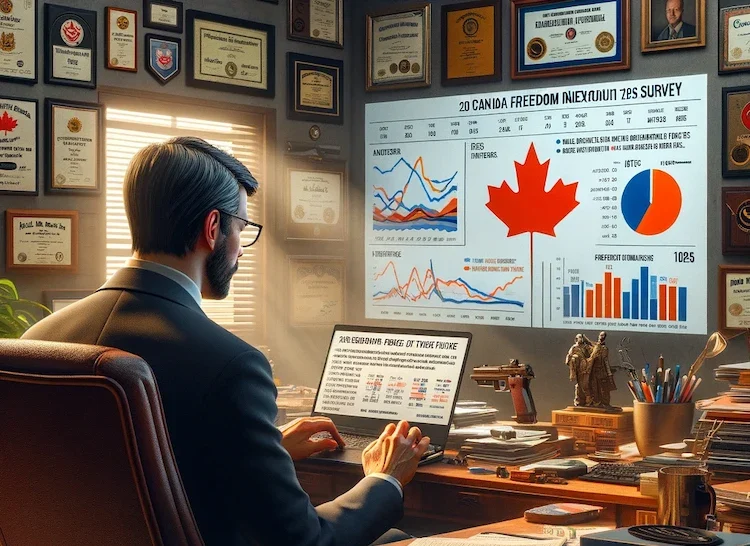
.
.
Related Reports:
Title: Constructing Canada’s Future: Pierre Poilievre’s Vision vs. Trudeau’s Record – An Analysis
.
.
.

.
.
.
.
.
.
Title: My Clinical License is as Good as Gone
Video: Bonuses at the CBC?! For what?!?!
@skillsgaptrainer “Keep at it, Andrew! You’re the best chance we have to root out the corruption in Canada’s public institutions. The issue of “Transparent Overcompensation Corruption” is concerning. In Canada, the notion that publicly declaring exorbitant self-compensation somehow negates the essence of corruption needs addressing. Your efforts are crucial in this regard. After dealing with CBC, Canada could launch a smaller, more agile, and online streaming Canadian organization. This new platform should truly embrace inclusivity, especially the perspectives of Millennials and Gen Z, who are influential on platforms like YouTube and Twitter. It’s vital not to remain isolated. Your role could be instrumental in integrating Canadian news into the global internet landscape, making it more relevant and accessible in today’s digital world. Thanks for your dedication, Andrew! Keep investigating and uncovering those who are trapping Canada’s billions of dollars in their offices, unused for real-world benefit!”
Title: LIVE: After 8 years, Trudeau/NDP, not worth the cost
Related books and resources:
“The Right to Privacy” by Samuel D. Warren and Louis D. Brandeis – This classic essay is foundational in understanding individual rights and privacy, topics that resonate with discussions on digital sovereignty and data control in the digital age.
“The Master Switch: The Rise and Fall of Information Empires” by Tim Wu – Tim Wu explores the cycle of information monopolies and the implications for freedom and democracy, relevant to discussions on media control, Bill C-11, and the balance between regulation and freedom.
“The Second Machine Age: Work, Progress, and Prosperity in a Time of Brilliant Technologies” by Erik Brynjolfsson and Andrew McAfee – This book delves into the impact of digital technology on economies and societies, touching on themes of digital sovereignty and the implications of technological advancements on individual freedoms.
“The Great Firewall of China: How to Build and Control an Alternative Version of the Internet” by James Griffiths – While focused on China, this book provides insights into internet censorship and control, relevant to discussions on Bill C-11 and online content regulation in Canada.
“The New Digital Age: Reshaping the Future of People, Nations and Business” by Eric Schmidt and Jared Cohen – This book explores the challenges and opportunities posed by the digital age, including discussions on privacy, freedom, and security that align with the topics of digital identity and sovereignty.
“Guns, Germs, and Steel: The Fates of Human Societies” by Jared Diamond – This book provides a broad historical perspective on the development of human societies, which can inform discussions on cultural heritage, societal development, and the impact of policy decisions like firearm regulation.
“The Gun Debate: What Everyone Needs to Know” by Philip J. Cook and Kristin A. Goss – This book provides a balanced overview of the issues surrounding gun control and rights, contributing to the discussion on firearm regulation and public safety in Canada.
“Why Nations Fail: The Origins of Power, Prosperity, and Poverty” by Daron Acemoglu and James A. Robinson – This book examines the factors that lead to the success or failure of nations, providing context for discussions on governance, freedom, and policy impacts on national development.
To see our Donate Page, click https://skillsgaptrainer.com/donate
To see our YouTube Channel, click https://www.youtube.com/@skillsgaptrainer
